Information for all ages.
HIGH SCHOOL GRADS
THOSE LOOKING TO CHANGE CAREER PATHS JOB SEEKERS
Whether it’s furthering your education or pursuing vocational training, The Quad Winter/Spring 2024 is here to help you on your career path.




Look inside for information to help you.
2024
Eastern Michigan University
Grand Valley State University
Macomb Community College
emich.edu
gvsu.edu
Educational Institutions Website
macomb.edu
Madonna University madonna.edu
Davenport Univ. davenport.edu
Eastern Michigan University emich.edu
Oakland Community College
Oakland University
Schoolcraft College
occ.edu
Grand Valley State Univ. gvsu.edu/next
Educational Institutions
Henry Ford College hfcc.edu/apply
Davenport Univ.
Davenport Univ.
Educational Institutions
Educational Institutions
Davenport Univ.
Eastern Michigan University
Grand Valley State Univ.
Henry Ford College
Henry Ford College
Lawrence Tech University
Davenport Univ.
Lawrence Tech University admissions@ltu.edu
Educational Institutions Website
Davenport Univ.
Eastern Michigan University
Grand Valley State Univ.
Lawrence Tech University
Macomb Community College
Oakland Community College
University of Detroit Mercy
Eastern Michigan University
Oakland University
Oakland University
Schoolcraft College
Eastern Michigan University
Macomb Community College macomb.edu
Oakland Community College occ.edu
davenport.edu
Eastern Michigan University emich.edu
Schoolcraft College of Detroit Mercy of Michigan
Univ. of Michigan
Wayne State Univ.
Wayne State Univ.
Univ. of Detroit Mercy
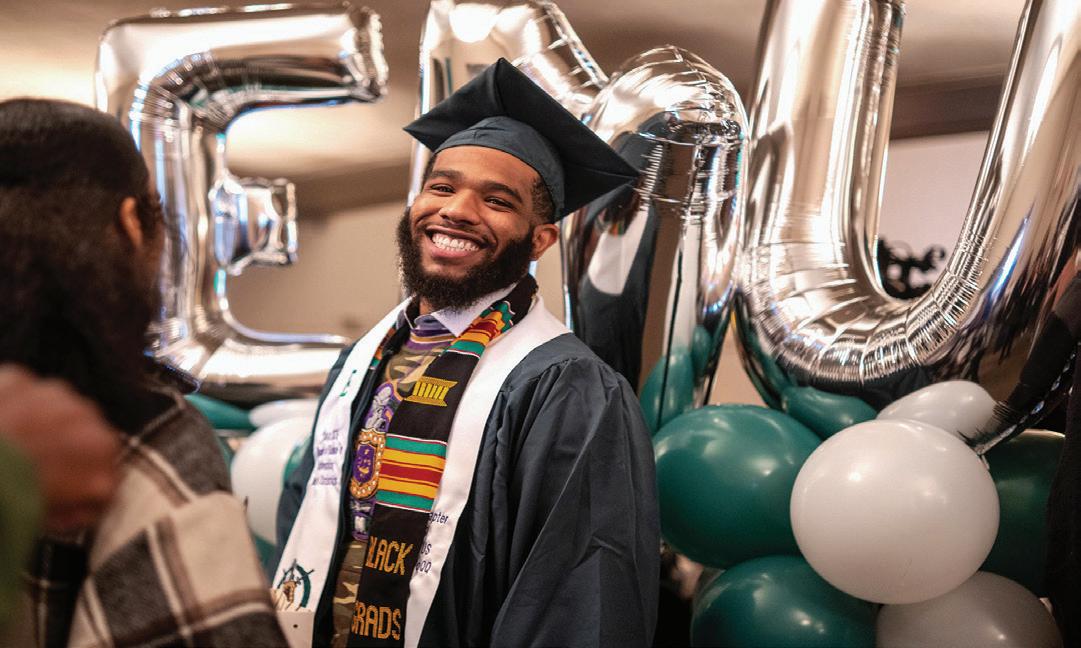
Western Michigan University
Educational Institutions Detroit at Work Focus:Hope Michigan Dept. of Labor and Economic Opportunity Oakland Community Health Network Wayne County Human Resources
Washtenaw Community College
Wayne State University
Lawrence Tech University
Macomb Community College
Macomb Community College
Oakland Community College
Oakland Community College
Wayne


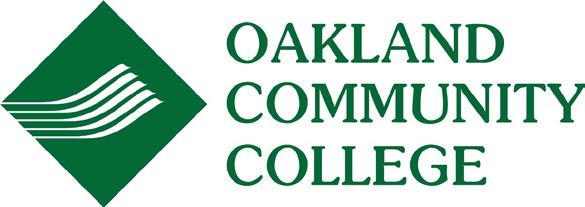
Grand Valley State Univ. gvsu.edu/next
Oakland University
Schoolcraft College
Univ. of Detroit Mercy
Univ. of Michigan
Wayne State Univ.
Grand Valley State Univ.
Henry Ford College
Oakland University oakland.edu
Schoolcraft College schoolcraft.edu
Henry Ford College hfcc.edu/apply
Wayne State Univ.
Situated
Western Michigan University
Lawrence Tech University
Macomb Community College
Univ. of Detroit Mercy admissions@udmercy.ed
Oakland Community College
Oakland University
Educational Institutions Whether
Detroit At Work detroitatwork.com
Whether your student is new to college or not sure what to do next in life–count on us to help!
Western Michigan University
Western Michigan University
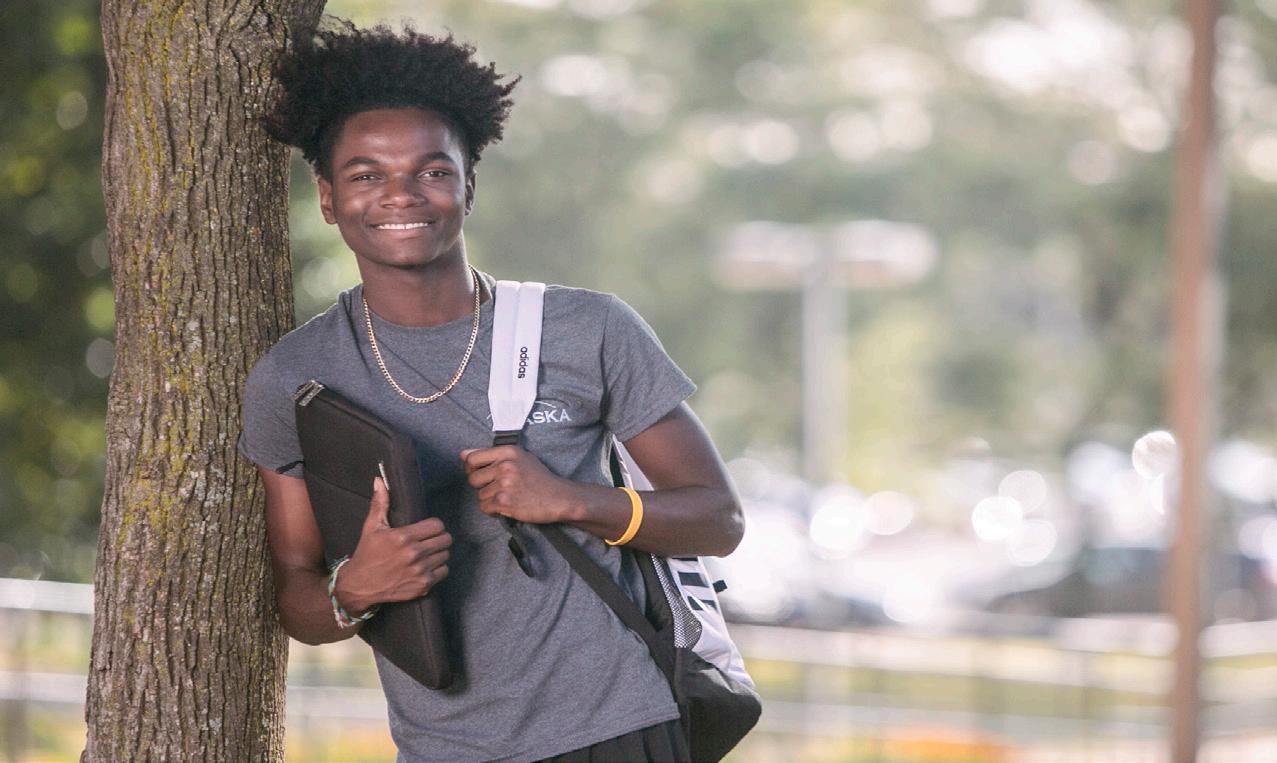
Detroit at Work
Focus:Hope
Detroit at Work















Univ. of Michigan goblueguarantee@umich.edu
Schoolcraft College
Univ. of Detroit Mercy
Univ. of Michigan
Michigan Dept. of Labor and Economic Opportunity
Oakland Community Health Network Wayne County Human Resources
Oakland Community Health Network oaklandchn.org
Wayne County waynecounty.com



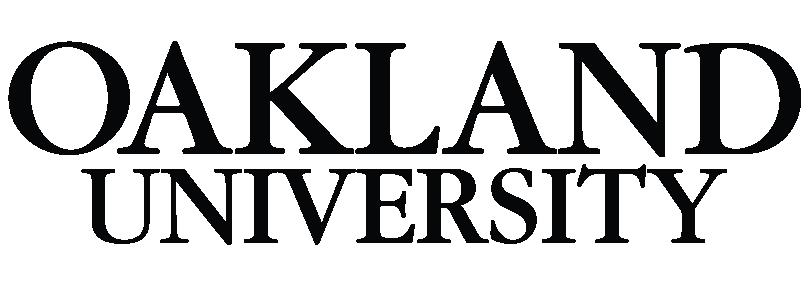


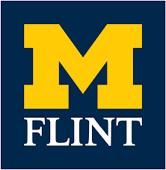























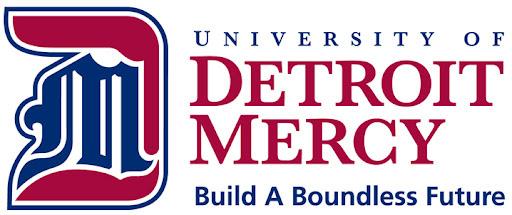


















And your investment goes far at Over 80% of our students leave
Learn

Students can apply, register and spring/summer, fall and winter
Michigan Dept. of

















Thank you to our community supporters 2 WINTER-SPRING | 2024
Davenport University davenport.edu
stu
The QUAD • FALL | 2022
Yo • The QUAD
sure
startto an ywh e
what
Detroit at Work Focus:Hope Michigan Dept. of Labor and Economic Opportunity Oakland Community Health Network
addition to our commitment to financial support, we believe that a campus isn’t just a place to study; it’s a vibrant home away from home. That’s why we’ve invested more than $200 million to completely renovate campus housing and provide modern, welcoming, air-conditioned and apartment-style living spaces that inspire creativity, foster connections, and offer the ultimate college lifestyle. Other newly renovated buildings include those that house the sciences, engineering and technology, dining, recreation and fitness center, and wellness.
you ready to start a transformative journey? Go to emich.edu/visit to schedule your campus visit today.
Become
County Human Resources Thank you to our participating educational institutions In
Are
Come as You Are.
More You.
Eastern Michigan University is dedicated to empowering you to be the best version of yourself.
in the vibrant heart of Southeast Michigan, you will have unparalleled access to internships, job prospects, cultural events, and entertainment. Picture yourself in newly Michigan University excellence meets unwavering support
Economic Opportunity
Learn more at macomb.edu/parents Yourstudent’sst reishee
Focus:Hope Michigan Dept. of Labor and
Oakland Community Health Network Wayne County Human Resources We are!
City of Southfield/Parks and Recreation cityofsouthfield.com/departments/parks-recreation
MISA
Mi.gov/Achievement
2 • The QUAD • FALL | 2022
Whether your student is new to college sure what to do next in life–count
Passionate and personable instructors Career pathways ranging from business to health Over 100 career–oriented degrees and certificates Ready to help your student We are! Yourstudent’sstartto an ywhereishere
more at macomb.edu/parents
diversity fuels academic excellence support, and where unapologetically you.
Stages of Life…Education and Career Choices
students from 50 call Eastern away from see why. We majors, minors, delivered through Sciences; the College of GameAbove College of Technology; and the Human Services. guide your ensuring that you graduate and are than 90% employed within graduation, you’ll step professional world, and knowledge scholarships and opportunities. Eligibility starts with a 2.75 and our wide programs includes Advantage—where grade-point average household income of less Grant eligibility undergraduate our priority, and shouldn’t stand in the
By the time you enter high school, you might have an idea of what you want to be.
You just may not know the road to take to get there.
You see people who are doctors, lawyers, pro ball players and teachers. You may or may not want to move in those directions, but know you want to work with your hands, entertain people or be an artist, actor, musician, architect or carpenter.
You are still considering your future at that point in your life. You are exploring your options and considering which college to attend.
Upon graduation from high school, you have more of a road map with consideration to selecting the college that offers the program that will prepare you for your chosen career.
Or maybe not…You might graduate from high school and decide you don’t want to go to college, you just want to start working and earn a nice salary. There are many job opportunities available without a college degree and they pay well.
Or later in life, maybe you have been working for a while in a career where you are not happy or you just want to explore new options. Changing careers is becoming more common.
The Quad wants to help guide you to information and people who can help you on your journey no matter where you are in life.
The participating schools want you to know you are welcome and they have programs you might be interested in. Please consider applying.
The advertising supporters want to share opportunities with you. Please contact them for current employment opportunities.
This is a guide to help you as you consider choices. Welcome to…THE QUAD
In addition to our commitment to financial support, we believe that a campus isn’t just a place to study; it’s a vibrant home away from home. That’s why we’ve invested more than $200 million to completely renovate campus housing and provide modern, welcoming, air-conditioned and apartment-style living spaces that inspire creativity, foster connections, and offer the ultimate college lifestyle. Other newly renovated buildings include those that house the sciences, engineering and technology, dining, recreation and fitness center, and wellness.
Are you ready to start a transformative journey? Go to emich.edu/visit to schedule your campus visit today.
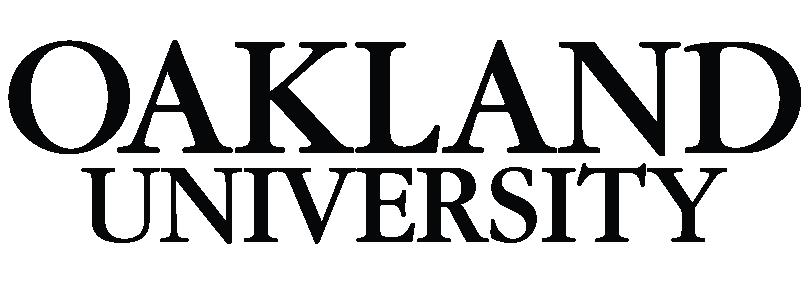



Become More Eastern Michigan University is dedicated to empowering you to be the best version yourself.
Situated in the vibrant Southeast Michigan, you unparalleled access to job prospects, cultural events, entertainment.
Picture yourself in newly renovated housing, complete air conditioning and enhanced Wi-Fi. Learn, grow and lasting connections.
Ready to experience the advantages of EMU? Visit website or contact our team to learn more.
emich.edu

CREDITS - ACKNOWLEDGEMENTS
Project Manager
Linda Moragne
Graphic Designer
Juan Sifuentes
Editorial Staff - Contributors
Jeremy Allen
Ebony JJ Curry
Donald James
Lynzee Mychael
Special contributor
Joseph Williams
WINTER-SPRING | 2024 • The QUAD • 3
THANKS SO MUCH TO OUR SPONSORS P 04 P 12 P 16 P 29 P 30 P 34 TABLE of It’s a Family Affair Racial Healing on Campus Success in Our Backyard Looking for a New Job Fastest Growing Jobs Addressing the MI Teacher Shortage at Eastern where
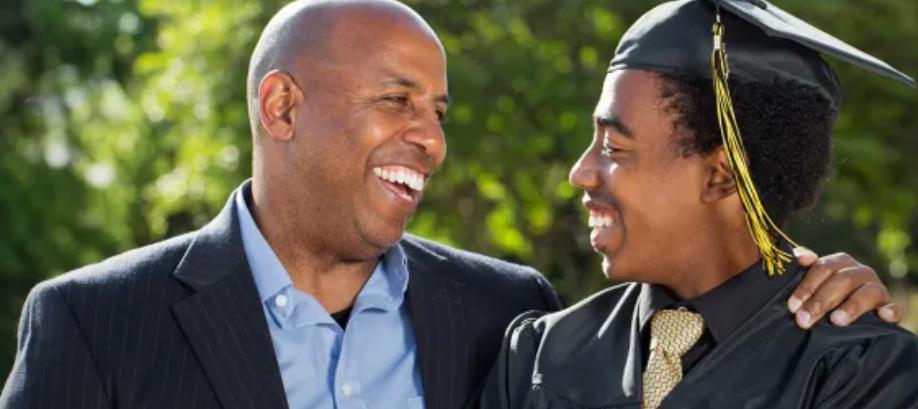
The Pivotal Role of Family Involvement in Shaping the Academic Success of Black Students
By Lynzee Mychael Multimedia Journalist
Embarking on the college journey is a mix of excitement and challenges for students, with parental support playing a pivotal role in determining their success. While parental involvement is universally recognized as crucial for academic achievement, its significance amplifies when considering the unique hurdles faced by black college students. To cultivate a supportive environment, it is imperative to explore strategies actively engaging black parents in their child’s educational journey, fostering both success and well-being. Recent studies conducted by CampusESP underscore the positive impact of parent engagement on student retention. An exploratory study involving nine universities and over 12,000 students revealed that students whose parents received regular updates on their progress exhibited over 8% higher retention rates, on average. Noteworthy institutions like Morgan State University reported retention rates exceeding 10% for students with families receiving regular school alerts. Family involvement, however, extends beyond conventional academic metrics. For many black students, success isn’t solely defined by grades but also encompasses the establishment of social networks and the development of cultural identity. Parents and family members play a crucial role in encouraging and supporting these aspects of a student’s educational journey. Recognizing and valuing diverse forms of achievement enables educators and administrators to create a more inclusive and supportive learning environment.
Understanding the Importance of Parental Involvement
Parental involvement is a multifaceted concept, spanning various activities, from attending school events to providing emotional support. While research consis-
tently underscores the positive impact of parental engagement on academic achievement and overall well-being, the challenge lies in tailoring strategies to address the specific needs and experiences of black college students.
Navigating higher education can be a complex experience for many black students, marked by potential cultural disconnects, financial constraints, and societal pressures. Therefore, engaging black parents in their child’s college journey becomes imperative to provide a robust support system that understands and addresses these challenges.
Kimberly Williams, whose daughter Taylor is a freshman at Clark Atlanta University, shares her perspective, stating, “My biggest concern was my daughter’s mental health and surroundings. I make a conscious effort to respect my daughter’s boundaries since she is an adult, but I consistently remind her that I’m here to help. The school has been great with updates on her progress. I’m able to stay up to date without making Taylor feel like I’m overbearing.”
Sharing academic and financial updates with families who have been granted Family Educational Rights and Privacy Act (FERPA) waivers proves to be an effective retention strategy. By keeping families informed about critical changes, including financial information, holds, and account balances, colleges and universities not only enhance student support but also uphold data privacy standards. This approach helps create a transparent and supportive environment that benefits both students and their families.
Strategies for Engaging Black Parents
Attend Parent Orientation Programs: Participate in parent orientation programs organized by the college. These sessions offer valuable insights into the college environment, academic expectations, and available resources.
Join Parent Associations or Networks: Many colleges have parent associations or networks that provide a platform for parents to connect. Joining these groups allows you to share experiences, gain insights, and collaborate with other parents.
Participate in College Events and Activities: Attend college events, such as family weekends, cultural celebrations, or academic seminars. Involvement in these activities strengthens your connection with the college community and demonstrates your commitment to your child’s educational journey.
Educate Yourself about College Resources: Familiarize yourself with the resources available on campus, including academic support services, career counseling centers, and mental health resources. Understanding the available support systems allows you to guide your child effectively.
Support Academic Goals and Planning: Discuss your child’s academic goals and help them create a realistic plan for success. Being actively involved in academic discussions shows your commitment to their education and encourages a collaborative approach to achieving milestones.
Explore Career Development Opportunities
Together: Actively engage in conversations about your child’s career aspirations. Attend career fairs, workshops, and networking events with them, providing practical insights into potential career paths. Encourage Internship and Networking Opportunities: Support your child in seeking internships and networking opportunities. Encouraging real-world experiences enhances their chances of success post-graduation and fosters a sense of initiative.
Attend Financial Aid and Scholarship Workshops: Stay informed about financial aid options, scholarship opportunities, and any available workshops. Actively seeking financial assistance ensures that your child can focus on studies without unnecessary financial stress.
Promote a Healthy Work-Life Balance: Emphasize the importance of maintaining a healthy work-life balance. Supporting a balanced lifestyle contributes to overall well-being and academic success.
Stay Informed about Cultural and Diversity Initiatives: Be aware of cultural and diversity initiatives on campus. Supporting cultural awareness fosters a sense of belonging and community on campus. Encourage Independence and Self-Advocacy: Foster independence by encouraging your child to take ownership of their education. Teach them to advocate for themselves when needed, promoting self-sufficiency. The intricate relationship between parental involvement and student success, particularly among Black students, highlights the need for targeted strategies and support mechanisms. As we navigate the complexities of education, recognizing the impact of parent-student discussions, proactive engagement, and addressing socio-economic disparities becomes essential. By fostering a collaborative approach between parents, students, and educational institutions, we can create an environment where every student, regardless of background, has an equal opportunity for enrollment and successful completion of their educational journey.
4 • The QUAD • WINTER-SPRING | 2024
Embarking on your college journey isn’t just about academics, it’s an opportunity to embrace a full campus life that extends beyond the classroom. Participating in clubs, sports and other extracurriculars not only adds fun to your college experience, but it also plays a pivotal role in shaping your character and skills. A vibrant campus offers many opportunities to pursue your interests and discover new ones. It’s a chance to break out of your comfort zone, try new things and develop well-rounded experiences.
To get a taste of college life and all it has to offer, take a campus tour — whether virtual or in-person — to help you determine which university is the best fit for you. At Davenport University, you can join students Majesty and Julius on a virtual experience of their campus by visiting davenport.edu/virtual-tour. You’ll get an in-depth look at Davenport’s facilities, student services and campus life. You’ll explore the university’s state-of-the-art classrooms, dining halls and labs, as well as recreational centers and student housing. Then, when you’re ready, you can schedule a time to visit Davenport in person. It’s important to note Davenport was named the #1 campus for safety in Michigan and among the top in the nation (source: YourLocalSecurity.com).
You’ll find that Davenport looks at the whole person, from professors who know your name and staff who work to know your interest There are more than 40 student organizations, 48 athletic teams and many weekly activities. The university is committed to students’ overall well-being, providing 24/7 mental health services and interactive events to help you manage stress and take care of your mental health.
cates, a scholarship for each incoming freshman student and an average student/ teacher ratio of 16:1.
You deserve a strong return on investment from your university, and it’s clear Davenport provides that — 94% are employed within six months of graduation.
Write your own college adventure. Join Davenport University, where every moment of transformation is a page in your book, and where the journey goes beyond academics, making every chapter unforgettable. If you’re ready to dive deeper into all Davenport has to offer, check out davenport.edu/newstudent, or call 800.686.1600.

You want to go to a university that will help you achieve your academic and professional goals. Davenport offers more than 80 career-ready degrees and certifi-
Career-ready degrees and so much more.
You might have heard that Davenport University offers more than 80 career-ready degrees and certificates, and that 94% of our graduates are employed within six months of graduation. But that’s not the only reason we stand out.
Our small, safe campus features apartment-style residence halls with private rooms and shared rooms. We also have 48 athletic teams, including 26 NCAA Division II teams, plus all kinds of clubs and activities. With 100% of our incoming freshman students receiving scholarships and an average student/teacher ratio of 16:1, our students get the resources they need to succeed.
Check us out at davenport.edu/newstudent or call us at 800.686.1600


WINTER-SPRING | 2024 • The QUAD • 5 Get where the world is going
Western Michigan University

Detroit at Work
Focus:Hope
Michigan Dept. of Labor and Economic Opportunity
Oakland Community Health Network
Wayne County Human Resources


A quality education is within reach with the first step…
The first step any high school student should take toward a bachelor’s is to complete the Free Application for Federal Student Aid (FAFSA). Even if you’re still deciding where to apply, fill out the FAFSA first because it will help determine what grants and scholarships you may qualify for. And that can make a big difference when it comes to paying for your education.
The 2024-25 FAFSA form has undergone changes and features a redesigned format with a reduction in the number of questions. Media reports on early glitches with the updated form are prompting questions and concerns. However, Wayne State University financial aid officials encourage all current students — and applicants — to complete the new FAFSA sooner rather than later (Wayne State’s school code is 002329).
“The earlier students file, if there are any issues with their application, we can correct it and we can get them ready to be awarded and have their financial aid disbursed before the fall semester begins,” said Cathy Kay, Wayne State University’s senior director of the Office of Financial Aid.
Although the FAFSA form is typically available in October, the overhaul resulted in its recent availability Dec. 30. Kay notes that filing early is especially important for applicants.
“We encourage all students to file early, but especially incoming students,” she said. “We have extended our priority deadline for two of our most successful and generous scholarship programs — the Heart of Detroit Tuition Pledge and the Wayne State Guarantee — to April 1. Anybody that files after that may not be eligible.”
By completing the FAFSA, you’ll find out which awards you qualify for that may cover your full tuition, including programs like Wayne Access and the Heart of Detroit Tuition Pledge.
Four main types of aid may be offered to a student in any combination:
• Grants based on financial need which do not require repayment.
• Scholarships based on academic credentials and special achievements which do not require repayment.
• Work-study positions or on-campus jobs with placements based on financial need.
• Loans, which must be repaid after graduation. Federal student loans are funded by the government and can be:
o Subsidized: Based on financial need, with the government paying the interest.
o Unsubsidized: No requirement to demonstrate need, and students pay the interest.
o Parent PLUS Loans: Parents may borrow federal loans to assist with college costs.
Kay believes that students will find that the new FAFSA is streamlined and more efficient. The maximum number of questions has been reduced from 108 to 46, and some students will answer as few as 18 questions, which could take less than 10 minutes.
You can submit the FAFSA to as many as 10 institutions before or after you have completed your admissions application.

“If students have any problems with accessing the FAFSA form, they should take a break and try again later,” said Kay. “The Department of Education is correcting issues every day as they occur.”
Kay emphasized that all students should file a FAFSA. “It’s even possible that a current college student who was previously ineligible for aid is now eligible, and regardless, it is a simplified — and free — form,” she said.
Wayne State offers nearly $329 million annually in federal, state, institutional and private aid through scholarships, grants, loans and work-study programs. Kay anticipates that colleges and universities will receive data from FAFSA in mid-March.
“We will be working as quickly as possible to notify our newly admitted and current students of their anticipated aid package for the 2024-25 academic year,” she said. “We recognize how important this information is to our students and their families.”
More than half of Wayne State’s fall 2024 first-year students were awarded financial aid packages that enabled them to attend the university tuition-free, due to many supportive financial initiatives.
“Wayne State’s commitment to affordability means that a quality education is within reach for everyone,” Kay said.
Wayne State University financial aid experts are available to answer your questions. Please call 313-5772100 or visit go.wayne.edu/fafsaresources to explore the full range of tools and resources.
6 • The QUAD • WINTER-SPRING | 2024
Wayne State Univ.
2 • The QUAD • FALL | 2022
tto an y
‘GUARANTEE’ IS IN THE NAME.
Wayne State University has always been committed to providing a quality and affordable education.
The Wayne State Guarantee is further proof of that commitment. It provides 100% free tuition and fees for qualified students using a combination of federal, state, and WSU scholarships and grants. Most students whose families earn $70,000 or less and have $50,000 or less in assets qualify.
Go to wayne.edu/apply to learn more about the Wayne State Guarantee, other competitive scholarships and attractive financial aid opportunities, and apply by the merit scholarship deadlines.
First-year fall 2024 student deadline: April 1, 2024
Transfer fall 2024 student deadline: June 1, 2024

wayne.edu/apply

WINTER-SPRING | 2024 • The QUAD • 7
By Jeremy Allen
In the dynamic heart of Detroit, where the city’s spirit dances with resilience, two universities, Wayne State University and the University of Detroit Mercy, serve as more than just educational institutions. They are vibrant communities where Black students from Detroit find a home away from home, navigating their academic journeys through on-campus organizations that transform the college experience. Although each school is located within the boundaries of Detroit, each school can offer a real “going away to college” experience, even though it’s just a 20-minute drive from essentially every neighborhood in the city.
Wayne State University, located in the bustling Midtown district, embodies diversity and inclusion. The campus becomes a second home for Black students through the tight-knit bonds forged in on-campus organizations. The Black Student Union (BSU), a dynamic force at Wayne State, orchestrates events that not only celebrate African American culture but also create a familial atmosphere that transcends the boundaries of academia.
For Black students, joining on-campus organizations is like stepping into a close-knit community, a microcosm within the vast campus. The BSU at Wayne State functions as a family away from home, offering mentorship programs, resources, and a safe space for cultural expression. Students can attend any of their open meetings to learn more about the organization or join, and annual elections help decide who holds committee seats within the organization. Through engaging events and initiatives, students find themselves envel oped in an environment that feels distinctly De troit, a space where the city’s legacy is not just remem bered but actively celebrated. The experience can quickly transform the feeling of staying home for school into one that deeply immerses students in a familial “campus away from home” environment.
Similarly, the University of Detroit Mercy, situated in the historic Fitzgerald neighborhood, seamlessly integrates on-campus organizations into its mission of service and social justice. The Institute for Social Justice becomes a rallying point for Black students, propelling them into a community-driven atmosphere that extends beyond the classroom.
Detroit Mercy’s commitment to social responsibility comes to life through on-campus organizations that bridge the gap between college life and commu nity engagement. Students actively participate in outreach programs, partnering with local orga nizations to address systemic challenges facing Detroit’s Black community. The Institute for So
cial Justice, in essence, transforms the university into a microcosm of Detroit itself, where students feel they are not just pursuing an education but actively contributing to the city’s resurgence.
The representation of Black voices in on-campus organizations and leadership positions becomes a powerful element that amplifies the sense of belonging. Both Wayne State and Detroit Mercy understand the importance of having mentors and role models who can relate to the unique experiences of Black students. By actively promoting diversity among their faculty and staff, these universities ensure that on-campus organizations are led by individuals who understand the challenges and aspirations of their students. With the abundance of opportunities for students to feel a part of campus life, engaged students are quickly made to feel like they belong and have a place to feel heard, accepted, and acknowledged. All these enriching opportunities create experiences that make WSU and UDM more than just a commuter school

As Black students engage with on-campus organizations, the universities leverage Detroit’s rich cultural tapestry to enhance their experiences. The Motown Museum, standing as a testament to the city’s musical legacy, becomes not just a tourist attraction but a vibrant part of the students’ cultural identity. On-campus events seamlessly weave the city’s history into the fabric of college life, creating an environment where black students can celebrate their roots while pursuing academic
Moreover, the strategic location of Wayne State and Detroit Mercy within Detroit’s evolving landscape adds an extra layer of richness to the college experience. The revitalization efforts in downtown Detroit provide students with a city backdrop that symbolizes resilience and growth. Student life becomes the bridge between the university and the city, transforming college life into a dynamic journey within a larger narrative of Detroit’s resurgence.
In essence, Wayne State University and the University of Detroit Mercy shine as great colleges for Black students in Detroit who are looking for an away-from-home experience without leaving the state or even the city, not only because of their academic prowess but because of the on-campus organizations that foster a sense of community and identity. These organizations create a home away from home within the city’s 139 square miles, allowing students to navigate their college experience in a way that feels distinctly Detroit.
As the universities embrace the city’s cultural heritage, Black students find themselves not just studying within the city but actively contributing to its vibrant tapestry of resilience and hope.
8 • The QUAD • WINTER-SPRING | 2024
The world needs Titans! The world needs YOU!
University of Detroit Mercy (UDM) is Michigan’s largest and most comprehensive Catholic university, offering more than 100 undergraduate, graduate and professional degrees and programs.
This year, The Wall Street Journal/College Pulse ranked UDM among the top higher education institutions in the U.S. for 2024. UDM ranked No. 52, making it:
• Michigan’s best Catholic institution.
• Michigan’s second highest-ranking university on the list.
• Fourth among Catholic institutions behind Georgetown, Boston College and Notre Dame.
• The third-highest ranked Jesuit university and only Mercy institution ranked.
These rankings are based on student outcomes. UDM students receive experiential and co-op opportunities, and engage in hands-on, real-world projects before they graduate. For example, this past December, the Department of Energy in Washington D.C. awarded UDM a grant of more than $3.79 million to help Michigan nonprofits increase energy efficiency. This means that scores of our engineering and architecture students and faculty will work with SE Michigan nonprofits to reduce carbon footprints and put energy savings into programs that help people in need. Learn more at https://www.udmercy.edu/about/outcomes.php.
When they graduate, UDM students earn an average of $67,000 a year compared to the national average

follows a $1.12-million award from the DoD in 2020 that helped UDM establish the Metro Detroit Regional Virtual Vehicle Cybersecurity Institute. The institute is a self-sustaining, regional, virtual cybersecurity workforce development entity formed through partnerships between academia, the vehicle manufacturing industry, and the DoD to address the shortfall of trained vehicle cybersecurity engineers and computer scientists to meet the needs of the military ground vehicle and transportation communities. For more, visit https://eng-sci.udmercy.edu/academics/engineering/ vehicle-cyber-eng.
And our students engage in significant research before they graduate that students at other schools must wait for until graduate school.
for new graduates of $58,000 a year. According to the Georgetown University report A First Try at ROI: Ranking 4,500 Colleges, Detroit Mercy graduates also rank among the top 10% of U.S. universities in earning a higher return on investment for their education. On average, a UDM graduate will earn $1.2 million more over the course of their career compared to those who forgo a college education.
Each year, UDM invests in resources to enhance programming to improve the student experience. Recently, the College of Engineering & Science received a $497,080 award from the United States Department of Defense (DoD) to sustain its work in establishing the Metro Detroit Regional Vehicle Cybersecurity Institute, a regional cybersecurity consortium. This


UDM is also dedicated to helping all students earn a degree. In early 2024, UDM rolled out the Titan Edge, a program that offers eligible Michigan students a transformative education from Detroit Mercy with zero out-of-pocket tuition costs! Learn more at https:// www.udmercy.edu/admission/financial-aid/sources/ titan-edge.php.
To learn more about how you can become a Titan, visit www.udmercy.edu today!

WINTER-SPRING | 2024 • The QUAD • 9 PRODUCING REAL OUTCOMES AND CAREER-LONG EARNINGS Did you know that recent Detroit Mercy graduates earn an average salary of $67,000 a year, well above the national average of $58,000? And according to the Georgetown University Center on Education and the Workforce, UDM grads rank among the top 10% in the country for overall career earnings. APPLY TODAY udmercy.edu | admissions@udmercy.edu Call 313-993-1245 or visit udmercy.edu/admission 4001 W. McNichols Road Detroit, MI 48221-3038 OUR WORLD NEEDS TITANS — OUR WORLD NEEDS YOU! The Quad 2024 Ad FINAL.indd 1 1/12/24 2:49 PM
A UDM faculty member explains the purpose of new state-ofthe-art technology used in the College of Health Professions’ Simulation, Technology and Research (STAR) Center.
Eastern Michigan University
Where academic excellence meets unwavering support
Your journey begins here, at Eastern Michigan University, where diversity fuels innovation, where academic excellence meets unwavering support, and where you can be unapologetically you.
More than 13,000 students from 50 states and 83 countries call Eastern Michigan their home away from home—and it’s easy to see why. We offer more than 200 majors, minors, and concentrations delivered through the College of Arts and Sciences; the College of Business; the College of Education; the GameAbove College of Engineering and Technology; and the College of Health and Human Services. Our expert advisors will guide your academic journey, ensuring that you stay on track to graduate and are career-ready. With more than 90% of our graduates employed within six months of graduation, you’ll step confidently into the professional world, equipped with the skills and knowledge employers seek.
We offer a wealth of scholarships and financial aid opportunities. Eligibility for Merit scholarships starts with a 2.75 grade-point-average, and our wide variety of scholarship programs includes the Eastern Tuition Advantage—where students with a 3.0 grade-point average and an annual household income of less than $60,000 or Pell Grant eligibility are qualified for free undergraduate tuition. Your potential is our priority, and financial barriers shouldn’t stand in the way of your dreams.

In addition to our commitment to financial support, we believe that a campus isn’t just a place to study; it’s a vibrant home away from home. That’s why we’ve invested more than $200 million to completely renovate campus housing and provide modern, welcoming, air-conditioned and apartment-style living spaces that inspire creativity, foster connections, and offer the ultimate college lifestyle. Other newly renovated buildings include those that house the sciences, engineering and technology, dining, recreation and fitness center, and wellness.
Are you ready to start a transformative journey? Go to emich.edu/visit to schedule your campus visit today.

10 • The QUAD • WINTER-SPRING | 2024
Come as You Are. Become More You.
Eastern Michigan University is dedicated to empowering you to be the best version of yourself.
Situated in the vibrant heart of Southeast Michigan, you will have unparalleled access to internships, job prospects, cultural events, and entertainment.
Picture yourself in newly renovated housing, complete with air conditioning and enhanced Wi-Fi. Learn, grow and make lasting connections.
Ready to experience the unique advantages of EMU? Visit our website or contact our admissions team to learn more.
emich.edu





WINTER-SPRING | 2024 • The QUAD • 11
Seventy Truth, Racial Healing, and Transformation Campus Centers nationwide teach students to ‘dismantle toxic racial hierarchies’
By Joseph Williams
Think of the phrase “racial healing,” and students sharing plates of tandoori or tikka masala in a college dorm room probably don’t come to mind. Perhaps as unlikely: That repairing centuries of trauma involves cadets at a once-segregated Southern military academy or a circle of people discussing their great-grandparents’ birthplaces.
Yet those scenarios, others like them, and the conversations around them are elements of events happening in Truth, Racial Healing and Transformation Campus Centers, a network of facilitators and programs designed to help undo harmful stereotypes, rewrite damaging narratives, and train people to dismantle toxic racial hierarchies at the grassroots level.
Sponsored in part by the American Association of Colleges & Universities, Truth, Racial Healing and Transformation Campus Centers host a broad range of programs, workshops, and “healing circles” that tackle racism and the disparities that stem from it, says Dr. Tia Brown McNair, AAC&U vice president for diversity, equity, and student success equity and inclusion and TRHT Campus Centers executive director.
“It’s necessary work, because the false belief in a hierarchy of human values still exists within our country and within our systems and our structures and our policies and our practices,” McNair says. “So as long as that still exists, there is a need for us to continue to do the work.”
Adapted from a five-point framework the W.K. Kellogg Foundation developed in 2016 with civic leaders and academics, the program aims to establish a basis for lasting change that pivots from conflict and division towards healing through facilitated dialogue, workshops, and exercises.
Based on five main concepts — narrative change, separation, economy, racial healing, and law — campus groups discuss everything from generational trauma to economic disparities and mass incarceration, according to the foundation’s web page. Setting aside blame and castigation, participants are encouraged to share personal experiences, embrace history, and practice empathy through “deep listening,” with
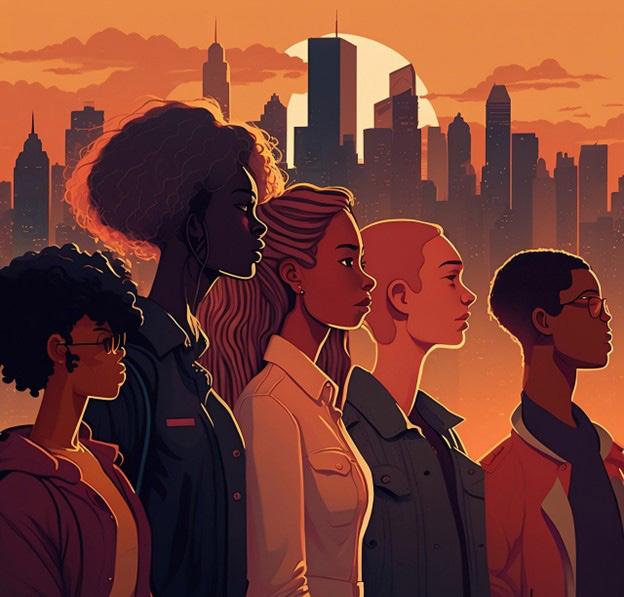
an eye on achievable, real-world goals.
“The THRT effort is not about blaming one identity group as being the reason as to why another group is experiencing harm,” McNair says. “TRHT is about focusing and helping. It’s about healing and listening to one another and engaging in deep listening and empathy and understanding our interconnectedness and our common humanity.”
“Yes, our (social) systems and our structures are flawed,” she adds, “but it is only together that we can actually do this work” of racial healing and societal progress.
According to the Kellogg Foundation, at the heart of TRHT is “community-led collaboration that is cross-racial, intergenerational, and cross-sector.” Open, honest conversations, the website says, are the best way to “gain an understanding of the predominant factors and conditions that are blocking (racial) progress.”
Although the Kellogg Foundation had initially deployed the TRHT framework to civic leaders from Buffalo to Los Angeles, the AAC&U signed on as a partner in 2017 after hearing that campus conversations around racial conflict had instead taken a disturbing, us-vs-them turn.
Seeing an opportunity amid the crisis, McNair and an AAC&U team, along with Dr. Gail Christopher, an esteemed facilitator, helped design a college-level version of the TRHT framework. It was an important decision: for most students, post-secondary education is a transitional period in life in which they are often more open to new ideas and perspectives.
With grant money from the Newman’s Own Foundation, AAC&U put out requests for proposals to create TRHT Campus Centers in colleges across the country. Although there was funding for just ten grants, McNair says more than 100 schools applied.
“Our goal at AAC&U is to ultimately partner with 150 higher education institutions to serve as host sites for TRHT Campus Centers at their institutions and within their communities,” she says. “We have an annual TRHT Summer Institute, which has served hundreds and hundreds of institutions who are interested in learning more about the THRT framework, and the methodology. And we now have 70 host institutions serving as partners with us.”
While the framework is largely the same from one school to the next, those campus dialogues and outcomes are unique to the community in which they occur. At Rutgers University, broader campus discussions began after three students involved in TRHT work — one white, one Muslim, and one Hindu — shared impromptu meals in their dorm rooms, sampling each other’s traditional foods.
The Citadel, a military academy in South Carolina, is rewriting its history to include stories of enslaved people working at the school as well as the attendance of cadets recruited from overseas, including Cuba and China.
At the University of Maryland-Baltimore campus, TRHT meetings at the Shriver Center include prompts that encourage participants to family ancestry to promote empathy and shared experiences.
At a time when entire states have all but banned colleges from teaching about race and history, expanding TRHT Campus Centers seems like an effort that’s flying against the prevailing political winds. But McNair believes lasting change starts at the grassroots level.
“I believe in the possibility of change, and I believe in the goodness of people and the goodness of our communities,” she says. “I’m not naive, and I’m not going to say that I think this is going to be the one thing” that permanently eradicates racial hierarchies.
Still, “I do know that we have to try,” McNair says. “And I do know that any progress we make is progress that should be valued and appreciated, because this is a long journey. And I’m committed to that journey.”
This story was produced in partnership with the W.K. Kellogg Foundation.
12 • The QUAD • WINTER-SPRING | 2024
ILLUSTRATION: RIBBET STOCK/LIZ COURQUET-LESAULNIER
Sarah Johnson graduated from Detroit’s Central High School 20 years ago. She earned an Associate Degree in General Studies from Macomb Community College and worked as a seamstress, a clothing and costume designer, and as an extra in several films shot locally. But it wasn’t until the mother of three returned to Macomb that she discovered how she wanted the next chapter of her life to read.
“The (Benjamin A.) Gilman International Scholarship changed my career path. More than a scholarship, it offers career (opportunities) within the federal government,” said Johnson. “It doesn’t guarantee a job, but it puts you in front of many people from whom you would otherwise be excluded.”
The scholarship was established in 2001 by the U.S. Department of State to develop a generation of leaders with first-hand knowledge of other cultures. It provides students financial assistance for study abroad programs and Johnson was the first Macomb student ever to receive it. The scholarship helped cover the expenses of the Global Business Study Abroad Tour she took to Italy last year with Macomb business faculty.
“Macomb has so much to offer. There are student-led clubs, groups, online courses, tutoring, resume writing and more,” said Johnson, who changed her major to international relations after her trip and plans to transfer to Oakland University next year. “My goal now is a career in foreign affairs. Leaning into our cultural differences and grasping those recognizable similarities is connective and precious.”
Darius Watkins was also seeking a connection when he returned to Macomb in 2021 after the Henry Ford II graduate decided to take a break from college in 2017. “There were other people in their mid-20s who had just returned as well, so I didn’t feel alone,” said Watkins. “I had a peaceful experience at Macomb. I enjoyed participating in my classes by asking questions and bringing my own personal experience to the table.”
Watkins knew from a young age that his calling was social work. His job with

Macomb County Community Mental Health (MCCMH) Crisis Services deepened his resolve and provided him with insight.
“Ever since I was a young child, I always had a knack for being helpful,” said Watkins. “As I have gone further in life, I’ve discovered there are many problems that need to be addressed.”
While a student at Macomb, Watkins attended Macomb Multicultural International Initiatives events on diversity. He also participated in the MLK Day of Service, the college’s largest volunteer opportunity held each January. He graduated last May with an associate degree in Pre-Social Work and a certificate in Community Leadership and is now pursuing a bachelor’s in social work at Oakland University.
“The Pre-Social Work program has helped me hone my abilities in the workplace and my personal life,” said Watkins, who is torn between becoming a case worker for the homeless or a mental health counselor. “(It gave me a) new perspective and outlook on how life functions and what we as social workers need to bring to the table to provide a better place.”



WINTER-SPRING | 2024 • The QUAD • 13
Join one or all of these exciting program-specific sessions! Health & Human Services .......................... March 13 Business, Information Technology & Culinary ......... April 23 Public Service Institute (police, fire & more) May 16 macomb.edu/discovermacomb Questions? 586.445.7999, select Admissions Come to: Discover Macomb
encouraged
bring
own personal experience
the table.”
Darius
Watkins appreciated that as a student at Macomb he was
to
“…my
to

An outreach program offered by Grand Valley State University received a Michigan Department of Education grant to expand programming to serve more students after school hours and during the summer.
TRIO Upward Bound received $286,080 to serve 120 more high school students in West Michigan and Detroit.
One of 11 federally funded TRIO programs at GVSU, Upward Bound provides support and opportunities for participants to succeed in their precollege performance and, ultimately, their higher education pursuits. The grant covers four GVSU Upward Bound programs: UB in Detroit and Grand Rapids and UB Math-Science in Detroit and Wyoming.
The money will go toward increasing student experiences, creating new academic partnerships, and hiring more college students to serve as tutors and counselors during a six-week Upward Bound summer camp on the Allendale Campus.
Nykia Gaines, assistant vice president for Federal TRIO Programs, said, “Expanding access to these 120 first-generation students means that their lives will be positively enriched by being on a college campus and knowing that they belong and have a place in higher education.”
Adam Harris, director of TRIO Upward Bound Detroit, said the grant allows the programs to expose 30 more students from University Prep High Schools to college and career resources.
Two GVSU TRIO Upward Bound programs opened in Detroit last year. Whitney Thomas leads programming for students from University Prep Science and Math; Harris leads the program for students at University Prep Academy and University Prep Art and Design.
Harris said a total of 120 students experienced a full slate of events and activities, including the summer camp on the Allendale Campus, an overnight campout with YMCA Camp Ohiyesa, and the opportunity to attend the GVSU Black Boys and Men Symposium and Girls of Color Summit.
Before joining Grand Valley, Harris worked for TRIO Upward Bound at Oakland University. He now works from Grand Valley’s Detroit Center, 163 Madison Street, and said the city offers a different type of energy. Harris continually meets with leaders from Detroit businesses and nonprofit organizations to establish partnerships.
“We now have lots of community partners. People are excited for this program, so many organizations are willing to assist in the process of getting Detroit students to college,” Harris said.
B. Donta Truss, vice president for Enrollment Development and Educational Outreach, said expanding access to Grand Valley’s programs aligns with the university’s mission.
“These programs are just one way Grand Valley lifts any barriers to education and helps students be more prepared for the rigors of college,” Truss said. “Expanding the number of students who participate in outreach programs also expands their knowledge of what being on a college campus is like. We hope to grow those connections throughout high school until these students step onto our campus as Lakers.”
The state grant was funded by the Michigan Department of Lifelong Education, Advancement and Potential, in partnership with the Michigan Department of Education.
14 • The QUAD • WINTER-SPRING | 2024
WHATEVER IS NEXT
For Grand Valley students, next is opportunity and innovation. Next is global, connecting and uniting us. It’s local, shaping the spaces in which we work and live. It’s a commitment to progress. Next is where minds are free to imagine what could be. At GVSU, next is now. And whatever’s next for you, we will help you get there.
gvsu.edu/next

WINTER-SPRING | 2024 • The QUAD • 15
By Ebony JJ Curry Senior Reporter
Here in Michigan, when a high school junior or senior sits and wonders what life looks like after graduation, Michigan offers this promise: you don’t have to leave home to become successful. Michigan offers a lot of universities that are top success stories, including some of the most influential and wealthy people that this nation has seen thus far. Michigan is a gem, and the people who are a part of it continue the legacy and push the narrative of tomorrow’s success.
Far from being mere dots on a map, Michigan’s universities are vibrant epicenters of knowledge, where dreams are forged into reality and futures are built. Here, the pursuit of excellence isn’t confined to textbooks but is a lived experience, making Michigan not just a state but a state of mind for those who dare to dream big.
The tales of success emanating from these institutions are not confined to academic journals or corporate boardrooms; they are written in the lives of individuals who walk the halls of these universities. From leaders who steer global enterprises to innovators who challenge the status quo, Michigan’s alumni are living proof that excellence knows no geographical bounds. Their journeys inspire, their achievements challenge, and their stories invite you to see yourself as part of this ongoing legacy of success.
As we turn the pages of Michigan’s educational saga, we’re not just reading about institutions; we’re witnessing a movement. A movement that champions diversity embraces innovation and believes in the power of community. It’s a narrative that encourages us to look beyond the familiar, to see potential in our backyards, and to realize that the journey to success begins with the steps we take here and now.
Michigan’s universities have been instrumental in shaping the trajectories of many notable individuals across various fields, from entertainment and sports to politics and business. Here’s a closer look at the influence of these institutions on a selection of distinguished figures:
David Allen Grier is an accomplished actor and comedian known for his work on the sketch comedy television show “In Living Color.” Grier honed his craft at the University of Michigan, where he earned a Master of Fine Arts degree from the School of Music, Theatre & Dance. His time at the university laid the groundwork for a successful career in both Broadway and television, highlighting the impact of Michigan’s commitment to the arts.
Dan Gilbert is the founder of Quicken Loans, the largest mortgage lender in the United States and owner of the NBA’s Cleveland Cavaliers. Gilbert
graduated from Michigan State University with a bachelor’s degree in communications and later earned his Juris Doctor from Wayne State University Law School. His entrepreneurial spirit was nurtured in Michigan’s educational ecosystem, which emphasizes innovation and business acumen.
Jemele Hill is a sports journalist who has worked for ESPN and now writes for The Atlantic. Hill’s passion for sports and writing was cultivated at Michigan State University, where she graduated with a degree in journalism. Her time at MSU was pivotal, providing her with the skills and opportunities to become a prominent voice in sports journalism.
George Gervin, nicknamed “The Iceman,” is a re tired professional basketball player widely regard ed as one of the game’s greatest shooting guards. Gervin attended Eastern Michigan University, where his exceptional talent on the basketball court began to shine. Although his time at EMU was brief, it played a role in launching his professional career.
Earvin “Magic” Johnson is a former professional basketball player and current President of basketball operations for the Los Angeles Lakers.
Johnson’s journey to fame began at Michigan State University, where he led the Spartans to the NCAA championship in 1979. His time at MSU not only polished his skills on the court but also instilled leadership qualities that would define his career.
James Earl Jones is an actor renowned for his deep, resonant voice, used to memorable effects as the voice of Darth Vader in “Star Wars” and Mufasa in “The Lion King.” Jones attended the University of Michigan, where he initially enrolled in the pre-med program before switching to drama, laying the foundation for his illustrious acting career.
Gerald Ford, the 38th President of the United States, attended the University of Michigan, where he was a star football player before graduating with a degree in economics. Ford’s time at Michigan not only contributed to his physical prowess but also developed his leadership and team-building skills, which would become hallmarks of his political career.
These individuals exemplify the diverse ways in which Michigan’s universities serve as catalysts for personal and professional development, preparing students to make significant contributions in their respective fields.
Dive deeper into Michigan’s academic heartland, and you’ll find a mosaic of institutions, each a microcosm of innovation and tradition.
From the campuses of the University of Michigan, Michigan State University, and Wayne State Univer sity, known collectively as the University Research Corridor, to the intimate, community-focused halls of Calvin University, Hope College, and Kalamazoo College, Michigan offers a kaleidoscope of educa
tional experiences. These aren’t just institutions; they’re launchpads for the next generation of thinkers, leaders, and visionaries.
The story of Michigan’s universities is not just about buildings and curriculums; it’s about the human spirit’s indomitable will to learn, innovate, and excel.
Michigan’s universities are more than just places of learning; they are beacons of hope and engines of change. They stand as a vivid reminder that education is the cornerstone of personal and societal growth; we’re not just building careers; they’re molding students today to

16 • The QUAD • WINTER-SPRING | 2024

Looking for a place to help knock out those prerequisites?
Schoolcraft
College is the place.
The College, located at Seven Mile and Haggerty in Livonia, has been educating students for more than 60 years. Over those decades, thousands of students have graduated and earned certifications in subject matters such as nursing, culinary arts, advanced manufacturing and more. With more than 130 academic programs, students can select courses of all types to help advance their careers.
That includes enrolling as a guest student, a great way to take advantage of the community college experience while still attending a four-year institution. Enrolling as a guest student has many benefits, namely financial: Schoolcraft’s tuition is approximately 1/3 the cost of the same course at a university, and about 1/4 the price of a private college. Being a guest student also has scheduling advantages. Enrolling at Schoolcraft College gives students an opportunity to sign up for a class they need for their degree program. Schoolcraft College offers smaller class sizes taught by faculty without the large lecture halls. And with the option of taking classes on the beautiful campus or online through the College’s award-winning Distance Learning program, options for guest students have never been greater. The process for enrolling as a guest student at Schoolcraft College is easy. First step: apply for admission. Guest students are exempt from taking placement tests or mandatory meetings with advisors (though advisors are always happy to meet to discuss students’ educational goals). Guest students also do not need to submit transcripts.
Second, register for classes through the
online portal, Ocelot Access. Here, students can access the catalog and sign up for their desired courses. Students should check to make sure their desired courses transfer appropriately back to their home institutions. Schoolcraft College has agreements with nearly every four-year college and university in Michigan, maximizing the likelihood of an easy transfer of classes. These credits can also go toward a Michigan Transfer Agreement endorsement, which allows students to complete a minimum of 30 semester hours of college-level credit to fulfill a portion of the lower-division general education requirements at participating four-year institutions. Students should always check with their advisors to make sure the classes they take at Schoolcraft will transfer properly. A list of transfer guides and articulation agreements can be found on the Schoolcraft College website at schoolcraft.edu/schoolcraft-to-u. It just takes two simple steps to complete guest student enrollment.
It is important to also remember: guest students are not eligible for financial aid funds, so plan accordingly when preparing to pay tuition and fees.
At the course’s end, students request their transcripts from Schoolcraft College and send them to their home institution.
Student success is what Schoolcraft College is all about, whether students are full-time or taking one class to help finish their degree. Those with questions about enrolling as a guest students can reach out to the College’s admissions department at 734-462-4426 or admissions@schoolcraft.edu.

WINTER-SPRING | 2024 • The QUAD • 17 YOUR PRIDE AWAITS #OCELOTPRIDE schoolcraft.edu
Your future is golden at Oakland University. We challenge you to think beyond four walls. To get out and create experiences for yourself. To find answers in the lab, the field, the stage and the community. With 130 undergraduate degree programs, you’ll fulfill your ambition amid a thriving campus community where educational excellence and immersive learning come alive. It’s where your professors become your mentors and help you make important connections between theory and practice. As published authors, noted researchers and renowned experts in their fields, they stand firm on years of academic excellence – and use their knowledge to cultivate and challenge yours.
Start strong
Starting your college journey can feel overwhelming. That’s why OU provides easy-to-access academic resources and advising appointments focused on individualized support to ensure your academic success. To boost a strong college launch, every first-year student and undecided transfer student receives extra support and guidance through their first year.
Get involved
College is more than getting a degree. It’s that golden feeling of home when you are on campus. It’s pursuing your purpose and finding your people. With that close-knit campus feel, you don’t get lost in the shuffle. At OU, we challenge you to explore your journey with countless opportunities, like joining a student organization or volunteering in the community — and making memories that last a lifetime.
Go beyond the books
It’s time to spark your curiosity and explore the world beyond the classroom. OU empowers students to explore career possibilities through hands-on learning. Immersing yourself in real-world experiences helps to identify your unique strengths, interests and values while developing a meaningful plan for gaining experience inside and outside the classroom. Located in Metro Detroit, Oakland University is at the epicenter of opportunity: Our students land internships and job placements with major corporations, local school districts, governments and nonprofits.
Take advantage of financial aid

Everyone deserves access to an outstanding education and all the valuable opportunities that come with it. That’s why we strive to make an exceptional education affordable. At Oakland University, we firmly believe in our responsibility to create pathways of opportunity for all students. We’re proud to offer free tuition for up to four years to eligible incoming Michigan freshmen. OU’s Golden Guarantee works in combination with the Michigan Achievement Scholarship, OU merit and need-based aid to help cover both tuition and other costs, such as housing and living expenses. More than 70 percent of all OU students receive some sort of financial assistance — including scholarships, grants, work-study and student loans — totaling more than $200 million annually.
Visit us in Rochester
Get a feel for our college community and learn what Oakland University is all about by visiting our beautiful campus in Rochester. With a variety of in-person events and student-led tours, you can find the experience that best fits your schedule and interests. Visit oakland.edu/ visit to get started.

18 • The QUAD • WINTER-SPRING | 2024

WINTER-SPRING | 2024 • The QUAD • 19
It’s almost as if Joel Lewis II was destined to end up at OCC, and not just because he hails from the southwest Detroit area. Joel’s greatest fan and mentor — his mom — set the example by earning her associates degree at OCC, as did his sister.
Joel took his family’s guidance to heart, but his career choice was still in question. A small part of him still wanted to turn his love of English and writing into a career as an advertising copywriter.


them. It wasn’t long into my OCC experience that I felt I was locked into exactly what I’m supposed to be doing…which is helping these impressionable, young kids try to reach a level they don’t even know is possible yet.”
Joel Lewis II is on schedule to complete his coursework and transfer by the fall of ‘24, and thanks to OCC and all of his hard work and dedication, his “someday” is fast approaching.
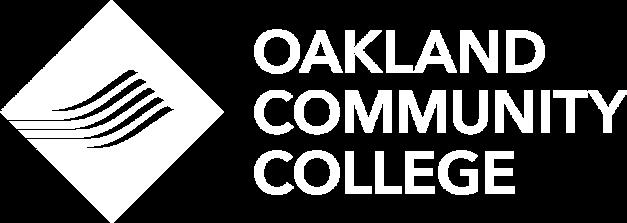 OAKLAND COMMUNITY COLLEGE oaklandcc.edu/admissions
OAKLAND COMMUNITY COLLEGE oaklandcc.edu/admissions
20 • The QUAD • WINTER-SPRING | 2024


WINTER-SPRING | 2024 • The QUAD • 21
Washtenaw Community College’s HBCU Pathway program helps students dream big

Do you dream of completing your college education at one of America’s Historically Black Colleges & Universities? The HBCU Pathway program at Washtenaw Community College (WCC) can help you realize your goals. The HBCU Pathway includes program mentoring, monthly workshops, study groups and many other support services to help students easily transfer from WCC in Ann Arbor to one of the college’s six HBCU partner schools.
WCC enrolls more than 20,000 students annually and prepares students for transfer and career success through 131 associate or certificate programs – 50 of which are completely online. The college’s wide range of offerings include educational programs that lead to high-demand jobs in computer technology, business, STEM, health care, mobility, the liberal arts and more. WCC is nationally recognized in cyber defense and nursing.
Established agreements with six HBCUs in four states means WCC students can be assured of a guaranteed admission into their new school, acceptance of general education credits, access to in-state tuition at most partner schools, eligibility for scholarships there and many other benefits.
Today, WCC has partnership agreements with Jackson State University (Jackson, Mississippi), Mississippi Valley State University (Itta Bena, Mississippi), Southern University at New Orleans (New Orleans, Louisiana), Alabama State University (Montgomery, Alabama), Tuskegee University (Tuskegee, Alabama) and Central State University (Wilberforce, Ohio). And that list is expected to grow.
On May 3 the college is expecting hundreds of high school students from throughout the region at its second annual HBCU Day. About 400 high school students attended last year’s inaugural event for a fun-filled day of learning about college and an affordable path to earning a bachelor’s degree from some of America’s most revered HBCUs.
Students heard from WCC’s HBCU partners, toured campus laboratories and enjoyed marching bands and a “Divine Nine” fraternity/sorority stroll off. While official agreements are in place with partner

HBCU schools, WCC’s counselors go the extra mile to help students interested in transferring to any of the nation’s 107 Historically Black Colleges & Universities. In addition to a seamless transition, the primary goal of WCC’s HBCU Pathway is to help keep college costs affordable for families. Between WCC’s already low tuition and numerous state scholarship programs such as the Michigan Achievement Scholarship and the Michigan Reconnect scholarship, WCC transfer students can manage their financial responsibilities and start their careers at a distinct advantage.
“Creating a pipeline for student success is essential to our mission, and it starts with access, nurturing students with big dreams and helping them realize the opportunities to further their education,” said WCC’s President Dr. Rose B. Bellanca.
Eric Reed, WCC’s Dean of Student Access, Success, Equity and Inclusion, said new students are continually joining the HBCU Pathway and are actively engaged in the regular workshops and mentoring activities.
“The HBCU Pathway is unfolding and growing just as we envisioned. Students have a supportive path to realize their academic potential and achieve success here at WCC and at the HBCU of their dreams. We stay in touch with students to help them any way they might need once they’ve transferred and, of course, we love hearing about how they are thriving in their new home,” Reed said.

HBCU Pathway and HBCU Day at WCC
Learn more about Washtenaw Community College’s HBCU Pathway and the May 3 HBCU Day by visiting wccnet.edu/hbcu or emailing diversity@wccnet.edu.
Testimonials from WCC alumni who’ve transferred to HBCUs
“I mostly chose Jackson State because I had heard all the hype and how great it was. If it wasn’t for WCC’s HBCU Pathway I wouldn’t have been able to go. They’re trying to help us get to these schools, and they’re seeing us. It also helped me keep my drive to further my education. These schools are very expensive, and the in-state tuition really helped, also.”
–
Zaria
Miller Jackson State University
“The HBCU Pathway is the reason why I’m at Central now. Being a first generation college student, it helped me a lot. The people around me are like, ‘I’m proud of you, but I don’t really know what’s good for you or what’s next,’ and the HBCU Pathway helped me push for that next step.”
– Elizabeth Perryman Central State University
“I inquired through a counselor at WCC who had gone to Grambling State University. He told me all the benefits of HBCUs and eased my mind about going out of state because that was something I was nervous about.”
– Kayla Ross
North Carolina A&T State University
“WCC prepared me for Morehouse College by offering rigorous courses and practical student leadership opportunities. A person who has been educated at WCC and an HBCU is destined to make a positive impact on the world.”
– DeVaughn Swanson Morehouse College

22 • The QUAD • WINTER-SPRING | 2024
What Do You Call Someone Who
Attended WCC? Employed.
Kayla Had Two Dreams...Helping Patients and Attending an HBCU
Plenty of students like Kayla Ross aspire to attend one of America’s Historically Black Colleges & Universities. WCC is poised to help with our HBCU Pathway.
This dedicated program prepares graduates for guaranteed admission and seamless transfer to most of our five HBCU partner schools. While Kayla graduated prior to the official launch of o ur HBCU Pathway, WCC’s Diversity & Inclusion team has always been here to help students achieve their dreams – even after they graduate.
In Kayla’s case she graduated with 55 credit hours at WCC’s low tuition rates and transferred to North Carolina A&T State University where she earned her bachelor’s degree in 2022. She is currently working through her clinical experience to become a Physician’s Assistant.
Her WCC counselor (who attended Grambling State University) and her WCC Student Success Team were there every step of the way as she went from a Ypsilanti Lincoln High School graduate to future PA. Find out how we can help you reach your HBCU and realize your dream! For further information on WCC’s HBCU Pathway, scan the QR code below.



WINTER-SPRING | 2024 • The QUAD • 23
©
By Ebony JJ Curry Senior Reporter
As the final bell of high school life tolls, students and their guardians stand on the precipice of a new chapter. This transition, filled with aspirations and uncertainties, demands a concerted effort toward Preparation, opportunity, commitment, and success. For Black students, this journey holds unique challenges and triumphs, underscoring the need for a tailored approach to post-secondary readiness.
The Foundation: Preparation
Preparation is the bedrock of future achievements. It involves a thorough exploration of interests, strengths, and career aspirations. Parents and students should engage in open dialogues about potential paths, be it college, vocational training, or entrepreneurship. Researching institutions that support Black students through scholarships, mentorship programs, and inclusive policies is crucial.
High school counselors play a pivotal role in this phase, offering insights into college prep courses, SAT/ ACT preparation, and application timelines. For Black students, seeking out historically black colleges and universities (HBCUs) or institutions with strong diversity and inclusion initiatives can provide a nurturing environment that celebrates cultural heritage while fostering academic and personal growth.
Tameka Gaddis, a counselor at Plymouth High School in Canton, brings a wealth of experience and insight into the realm of education. With a bachelor’s degree in biology from Eastern Michigan University earned in 1997 and a master’s degree in School Counseling from Central Michigan University obtained in 2011, Gaddis’s journey from a science teacher to a school counselor has been marked by her dedication to fostering student success across various school districts in the Detroit Metro area. Her transition from teaching science on both the westside and eastside of Detroit to guiding students through their academic and personal challenges as a counselor underscores her multifaceted understanding of the educational landscape.
Drawing on her 25 years of experience in education, Gaddis emphasizes, “Preparation is instrumental to success in higher education. Working in the education field for the last 25 years, I have seen many students with the goal of obtaining a degree from a 4-year university or 2-year college. In order to reach this goal, students must first be prepared for the road ahead academically, financially, and most importantly, socially and emotionally. A college degree is much more than academics. Many people tend to only think of academics when speaking of higher education. While academics is important and certainly the center of the higher education degree, the financial, social, and emotional aspects play a major role as well.”
In the pivotal journey from high school to higher education, the paths to seizing opportunities are manifold,

particularly for Black students navigating the landscape of college admissions. Central to this journey is the strategic approach to scholarships, standardized test scores, and the discerning selection of higher education institutions, be they Historically Black Colleges and Universities (HBCUs) or Predominantly White Institutions (PWIs). Each of these elements plays a critical role in shaping the academic and professional futures of young individuals.
The Strategic Importance of Scholarships
Scholarships are invaluable in mitigating the financial barriers that often deter talented students from pursuing higher education. For Black students, the pursuit of scholarships is not merely a financial necessity but a strategic endeavor to access quality education and professional opportunities without the looming burden of student debt. Scholarships can range from merit-based awards, which recognize academic, athletic, or artistic talent, to need-based scholarships that aim to make education accessible to students from lower-income backgrounds. Specialized scholarships also exist to support students from minority groups, including those specifically designed for Black students, such as those offered by the UNCF or the Ron Brown Scholar Program.
The proactive search for scholarships should be an integral part of the college preparation process, with students and parents exploring various databases, community organizations, and institutional scholarships to uncover those that align with the student’s achievements and aspirations.
The Role of Commitment
Commitment is the fuel that drives the journey towards success. It means setting goals, staying disciplined, and overcoming obstacles. For Black students, this includes navigating systemic barriers and disproving stereotypes. Cultivating a strong support system of family, mentors, and peers who understand and share these experiences is vital.
Parents can foster commitment by setting high expectations, encouraging resilience, and celebrating every milestone. It’s also important to have honest conversations about the challenges of racism and discrimination, equipping students with the tools to advocate for themselves and others.
“So how can students prepare? It begins early in life, but even if a student gets a late start success is still obtainable,” Gaddis stated. “Having a support team or “village” that supports student’s dreams and goals is a great way to help handle the stresses of college and be successful.”
Choosing Between HBCUs and PWIs
The choice between attending an HBCU or a PWI is a deeply personal decision that can influence a student’s college experience and professional trajectory. HBCUs offer a culturally affirming environment where Black students can pursue academic excellence while celebrating their heritage and building a strong sense
of community. These institutions often provide robust support systems and networking opportunities tailored to the needs and aspirations of Black students. Conversely, PWIs may offer specific programs, resources, and diverse networking opportunities that align with certain career goals. The decision should be informed by careful consideration of the student’s academic interests, career objectives, and the cultural and social environment that will best support their growth and development.
The Role of Extracurriculars, Internships, and Networking
Participation in extracurriculars, securing internships, and building a strong network are pivotal elements in shaping a student’s personal growth and career readiness. These activities not only enhance a student’s appeal to colleges but also cultivate critical life skills, including leadership, collaboration, and analytical thinking. For Black students, engaging with organizations such as the National Society of Black Engineers (NSBE) and initiatives by the Thurgood Marshall College Fund can open doors to mentorship, career guidance, and financial support in industries where representation is needed.
Moreover, the significance of attending college fairs and sessions tailored for minority students cannot be overstated. These platforms provide invaluable insights into the support structures, academic offerings, and community life of various institutions, empowering students to make choices that align with their aspirations and values.
Diving deeper, the decision to join sororities and fraternities, especially those within the Divine Nine—the esteemed collective of historically African American Greek-letter organizations—holds profound implications. Membership in these organizations extends beyond social engagement, offering a deep sense of belonging, lifelong networks, and professional opportunities. The bonds formed within these groups often lead to mentorship, community service initiatives, and leadership development, underpinning a legacy of excellence and unity among Black students and alumni. This rich tapestry of extracurricular engagement, networking, and Greek life involvement lays a foundation for success that transcends the collegiate experience, fostering a community of support that endures well into professional life.
Conclusion
As parents and high school graduates, particularly those from the Black community, navigate the post-secondary landscape, remember that Preparation paves the way for opportunities, commitment fuels the journey, and success is a testament to resilience and determination. By embracing these steps, students can transition from high school with confidence, ready to carve out their own paths of success in a world full of possibilities.
24 • The QUAD • WINTER-SPRING | 2024
Support. Opportunity. Affordability. It’s all within reach at Madonna University.
Navigating the college journey can be overwhelming. From navigating applications to managing the costs, the path can feel uncertain. But what if you had a supportive partner by your side, guiding you every step of the way?
At Madonna University, we take the guesswork out of your future. We offer:
• Personalized Support: We offer various pathways to success. Throughout your journey, you’ll have dedicated advisors and the Center for Personalized Instruction (CPI) to provide free, one-on-one tutoring, ensuring you have the individual support you need to thrive.
• Opportunity: Service-oriented learning is woven into the fabric of your education. Choose from a variety of majors that will equip you to positively impact lives in fields like healthcare, education, and social work. Our strong liberal arts foundation ensures you develop transferable skills valued across industries leaving you adaptable and future-proof after graduation.
• Affordability: Madonna University understands the importance of making your education accessible. That’s why we offer generous merit awards and co-curricular scholarships for students involved in athletics, performing arts, and the Mosaic Leadership Academy, allowing you to pursue your passions and talents without compromising your financial goals.
At Madonna University, support, opportunity, and affordability aren’t just words – they’re the foundation for your success. We don’t just prepare you for a career, we empower you to make a difference, equipped with transferrable skills and real-world experience.
Don’t let uncertainty cloud your future. Explore our diverse programs, discover
scholarships tailored to your goals, and experience the supportive community that will help you thrive.
Visit our website at madonna.edu to explore our programs, schedule a campus visit, and make your college dream a reality.


WINTER-SPRING | 2024 • The QUAD • 25
Finding opportunities to help Michigan students pay for college is easier than it’s ever been. Recent changes made by the Biden administration to the federal financial aid application known as the FAFSA, simplify the form and cuts the time it takes to unlock scholarships like the Michigan Achievement Scholarship award. In 2023, the Michigan Achievement Scholarship awarded over $53 million to more than 25,000 students across the state to help lower the cost of college. This year the state hopes to significantly increase those numbers for students and families — and all Michigan students have to do to be eligible is complete one step.
“The Michigan Achievement Scholarship really is a game changer in bringing college affordability to many students and families that has not been available in previous years,” said Michelle Richard, director of the Michigan Department of Lifelong Education, Advancement, and Potential’s (MiLEAP) Office of Higher Education, which administers the scholarship. “This scholarship can reduce the costs for postsecondary degrees and certificates at eligible community colleges, tribal colleges and public and private universities in Michigan.”
The Michigan Achievement Scholarship provides eligible students up to $27,500 for college and is available to all students who earn a diploma, certificate of completion or high school equivalency certificate in 2023 or after. It provides renewable scholarships for up to $8,250 over three years at a community or tribal college, up to $27,500 over five years at a four-year public college or university or up to $20,000 over five years at a private college or university
Michigan students who earn or will earn a diploma, certificate of completion or high school equivalency certificate in 2023 or after are eligible for the scholarship. Students must be a Michigan resident for at least a year and demonstrate financial need when they complete the FAFSA— for Academic Year 2024-25, by having a Student Aid Index (SAI) of $30,000 or less.
The scholarship becomes available by completing the newly simplified Free FAFSA. FAFSA is a tool that schools use to evaluate students’ financial strength and is based on the parent’s and student’s income and assets.
The once-complicated, time-consuming and daunting form has been revamped, simplified and transformed into a user-friendly version that officials say will make it easier for students and parents to complete. The new form is far less complicated, has fewer questions — streamlined from 108 down to 38 — and takes less than an hour to complete. There are also resources to help, including online at studentaid/gov.
“I strongly encourage students and families to complete the FAFSA so they can unlock this potential financial assistance and make the dreams of a higher education possible,” Richard said. “Completion of the FAFSA opens the door to so many opportunities for students that they may not have known about.”
The form can be completed online at FAFSA.gov or submitted by mail. It is recommended that high school students sit down with their parents, or those contributing to their education, to complete it as soon as possible. A contributor can include the student, student’s spouse or a parent (biological or adoptive or a stepparent). Being a contributor does not mean the person will be financially responsible for the student’s education.
The first step in the process is to create a login on the Student Aid website. The login is referred to as an “FSA ID.” You will need your Social Security number to create an account. Instructional videos and live chat are available at the Federal Student Aid Information website (studentaid.gov). You can also call 800-433-3243.
While completion of the form can open doors for Michigan students, it also
has great potential to create a brighter future for the entire state.
The state’s investment in the Michigan Achievement Scholarship and other programs is helping build a better Michigan by providing incentives to students to get their education in state, train for and find good-paying jobs and raise and support families.
“The state of Michigan is committed to growing the talent level of Michigan’s workforce, and that starts with education,” said Richard. “We want to provide opportunities for every Michigander to advance their education. We believe in our students and that is why we have made historic investments in education at every level beginning with preschool and extending through postsecondary learning and skills training programs.”
To learn more about the Michigan Achievement Scholarship, families are encouraged to register for informational webinars provided by the MiLEAP MI Student Aid team. For details, visit www.michigan.gov/achievement.
You can find additional financial resources needed to pay for college by contacting MI Student Aid at mistudentaid@michigan.gov or 888-447-2687 or going to @mistudentaid on Facebook, Twitter and Instagram.
For FAFSA-related information, go to www.fafsa.gov.

26 • The QUAD • WINTER-SPRING | 2024

Fill out the FAFSA to see if your HS senior is eligible for up to $27,500 in scholarship money.
Having a senior in high school is a lot of work – finding funding for their college education shouldn’t be. The simplified FAFSA can take 30 minutes or less to complete, and there’s a good chance your student will qualify for a Michigan Achievement Scholarship.
7 out of 10 Michigan High School Seniors may be eligible, no matter their grade point average. So, go ahead – give tuition worries a TKO.
Learn more and fill out the FAFSA today!
mi.gov/ACHIEVEMENT

Knock out your tuition worries!
DAVENPORT Junior Exploration
May 18, 2024
10 a.m. – 2 p.m.
Grand Rapids Campus
MACOMB COMMUNITY COLLEGE | DISCOVER MACOMB – LEARN MORE ABOUT:
Health & Human Services Business, Information Technology Culinary Public Service Institute (Police, Fire and more)
WASHTENAW COMMUNITY COLLEGE
“Discover WCC” event Saturday, April 13, 2024 Noon-4:00 p.m.
SCHOOLCRAFT COLLEGE Campus Tours
Every Thursday
https://www.schoolcraft.edu/admissions/visit-tour
Wayne State University Open House
Saturday, March 2, 2024 10 a.m.-2 p.m.
28 • The QUAD • WINTER-SPRING | 2024
When you embark upon your career or a new employment venture, you feel a sense of purpose and have a chance to continue to learn new skills. Your first job might not be your ideal job. You want to get your foot in the door, learn as much as you can so you can advance when you can. The goal of most of us is to work to earn a living to achieve and acquire what we desire.
Our great state of Michigan offers many employment opportunities. We want to present some of them to you in this edition of the Quad. We thank our advertisers who want you to know about current opportunities …The City of Detroit, Wayne County and Oakland Community Health Network. There are openings in many areas with the City and County.
Oakland Community Health Network wants you to know that you would be welcomed into a great family of workers dedicated to helping others. We invite you to acquaint yourself with these opportunities.

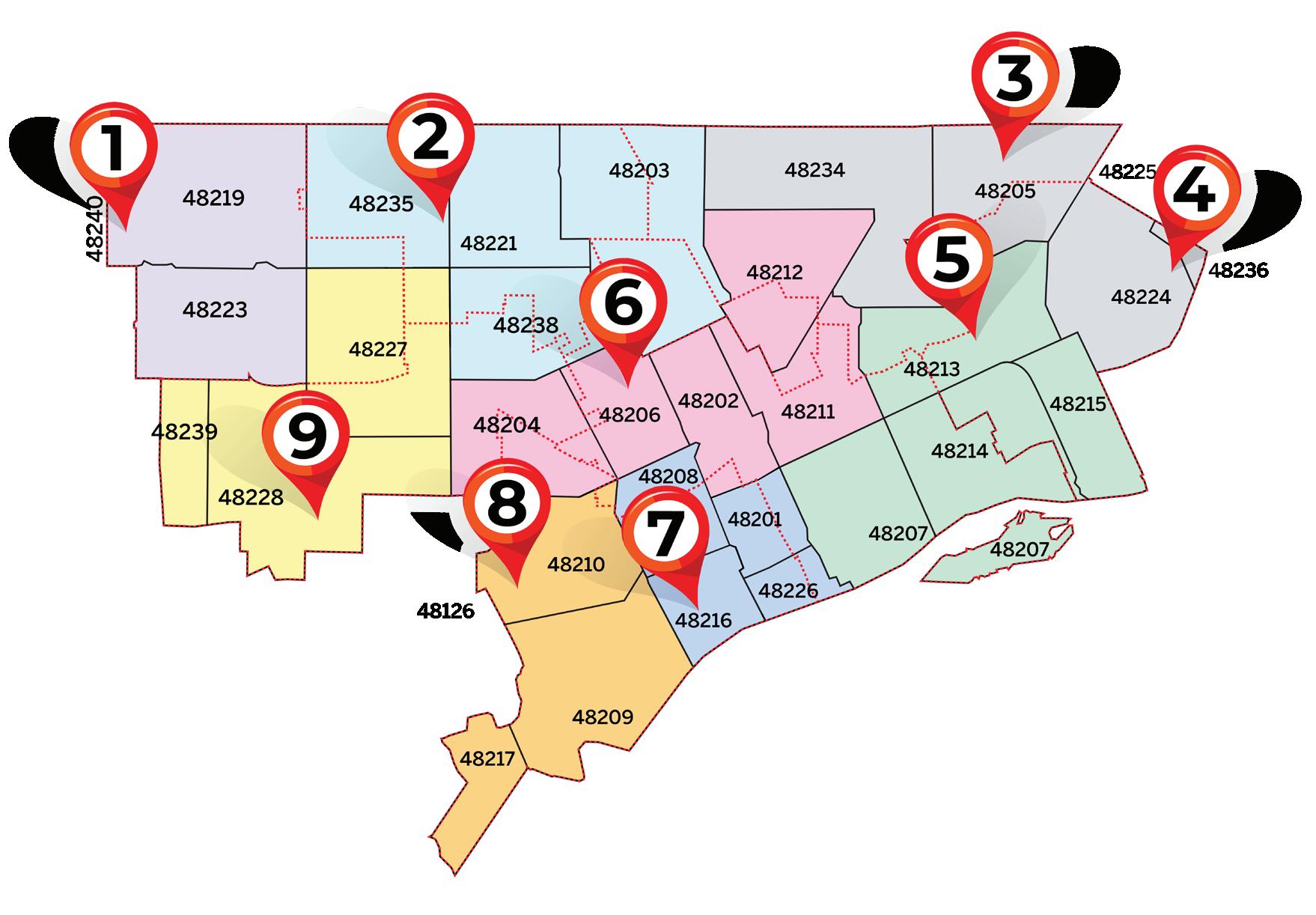

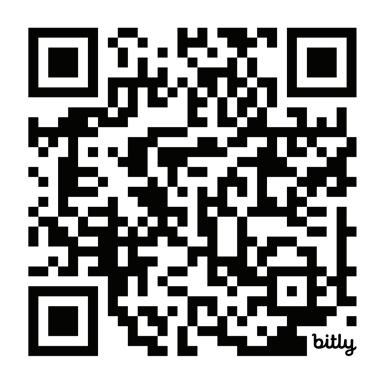
WINTER-SPRING | 2024 • The QUAD • 29 Powered by Detroit Employment Solutions Corporation, a Michigan Works! Agency. Equal opportunity employer/program. Supported by the State of Michigan, Department of Labor and Economic Opportunity. Proud partner of the American Job Center network. Auxiliary aids and services available upon request to individuals with disabilities or language needs. 1-800-285-WORK. TTY: 711.
Jobs Available 50+ Career Training Programs
Locations Across Detroit Your Job Search Starts Here 313-962-WORK (9675)
5,000+
9
 By Donald James Senior Writer, Real Times Media
By Donald James Senior Writer, Real Times Media
Michigan’s workforce and levels of talent are unmatched. According to the Michigan Economic Development Corporation, the state ranks No. 1 in the nation for its concentration of engineers, is top-10 for its skilled trades workforce, No. 1 for its concentration of commercial and industrial designers, Top 10 for growth of IT jobs and cybersecurity leadership, and No. 4 for its workforce in engineering, design, and development.
In 2023, the State of Michigan’s Department of Technology, Management and Budget, in conjunction with the Bureau of Labor Market Information and Strategic Initiatives, amassed a list of the “Hot 50” jobs in Michigan for the next decade. The following are 15 of the 50 hot in-demand jobs/occupations, projected annual openings, hourly wage range, and educational/training needed for the positions.
Accountants & Auditors (3,735 projected annual openings), hourly wage range $29 - $44, bachelor’s degree, license required.
Child, Family, and School Social Workers (1,420 projected annual openings), hourly wage range $19 - $30, bachelor’s degree or higher, license required.
Electricians (2,655 projected annual openings) hourly wage range $23 - $38, apprenticeship, license required.
Financial Managers (1,485 projected annual openings): The hourly wage ranges from $47 - $78, with a bachelor’s degree and work experience required.
Computer & Information Systems Managers (925 projected annual openings), hourly wage range $49 -$78, bachelor’s degree, license required.
General & Operations Managers (6,545 projected annual openings), hourly wage range $29 -$72, bachelor’s degree and work experience required.
Heavy & Tractor-Trailer Truck Drivers (7,635 projected annual openings), hourly wage range $19 - $29,
short-term On the Job Training (OJT), and specified license required.
Industrial Engineers (2,280 projected annual openings), hourly wage range $36 - $48, bachelor’s degree, license required.
Mechanical Engineers (2,920 projected annual openings), hourly wage range $37 -$49, bachelor’s degree, license required.
Medical & Health Services Managers (1,505 projected annual openings), hourly wage range $37 -$61, bachelor’s degree, work experience required.
Nurse Practitioners (595 projected annual openings), hourly wage range $48 - $60, master’s degree, license required.
Registered Nurses (6,345 projected annual openings), hourly wage range $40 - $58, bachelor’s degree, license required.
Sales Reps. Services and Non-Technical Goods (8.240 projected annual openings), hourly wage range $21 - $40, moderate-term, On the Job Training (OJT).
Software Developers & Quality Assurance Analysts (3,965 projected annual openings) hourly wage range, $37 - $58, bachelor’s degree required.
Substance, Behavioral, and Mental Health Counselors (1,025 projected annual openings) hourly wage range $19 - $29, bachelor’s degree, license required. In addition to Michigan’s “Hot 50” Job Outlook” listings, other Michigan industry forecasting stakeholders point to the healthcare industry and Science, Technology, Engineering, and Mathematics (STEM) sectors as two of the state’s fastest-growing and in-demand areas of employment. Michigan is also fast becoming a national leader in the electric vehicle industry.
In a 2023 report from the World Resources Institute, a global research organization based in Washington, D.C., the non-profit wrote that Michigan is projected to gain 56,000 electric vehicle jobs by 2030, making it a national leader. To accommodate the growing number of EV jobs, more high-tech workers will be needed in Michigan to support electric vehicle production, includ-
ing software developers, electrical engineers, chemical engineers, and more.
Numerous organizations in the Southeast Michigan region have been created to help individuals learn more about career and employment opportunities across broad industries. Michigan Works! and The Workforce Intelligence Network (WIN) for Southeast Michigan are two such organizations.
Michigan Works! was formed by a system of regional entities and was the first unified workforce development system in the United States. The network is an integral partner in developing Michigan’s economic future. Michigan Works! delivers resources aimed at building the state’s workforce and ensuring economic opportunities. The organization’s mission is to connect local talent and job leaders with the advocacy, training, and information tools to be successful in their communities. The Michigan Works! The system is committed to developing a skilled workforce through education, innovation, and collaboration on every level. Michigan Works! influences educates and inspires actions that keep Michiganians working. Through Michigan Works! residents of the state have access to professional development and high-quality training opportunities. To learn more about Michigan Works!, log on to https:// www.michiganworks.org/.
Workforce Intelligence Network (WIN) for Southeast Michigan is recognized by the U.S. Department of Labor as a progressive and effective organization with vast partnerships and resources leading to training, education, jobs, and careers for residents of Michigan. WIN’s partnerships connect ten community colleges and seven Michigan Works! agencies in Southeast Michigan. WIN specializes in fostering viable and successful collaborations among talent partners, including workforce development entities, community colleges, four-year post-secondary institutions, K – 12 schools, economic development organizations, various levels of government, community-based organizations, employers, and others. To learn more about WIN, log on to https://winintelligence.org/.
30 • The QUAD • WINTER-SPRING | 2024

Oakland Community Health Network (OCHN) leads a provider service network that assists approximately 29,000 Oakland County citizens at more than 400 service sites across the county.
People who receive public behavioral health services through OCHN’s provider network include those who have an intellectual or developmental disability, mental health challenge, or substance use disorder. Most of these individuals have Medicaid insurance coverage. OCHN’s goal is to ensure these individuals are aware of and have access to services and supports
that will improve their health and quality of life, as well as ensure their engagement in full community participation.
OCHN puts people first. Just as it always has from the onset of the publicly funded, public mental health service system. OCHN serves as the safety net for those in greatest need as well as the hub for the entire county for crisis services.
OCHN also has a strong advocacy network to ensure individuals’ rights are protected and their voices are heard. These efforts assist Oakland County residents in receiving quality, community-based services that promote inclusion, as well as protect their rights as U.S. citizens.
OCHN staff work tirelessly to connect with people where they live, play, work, and worship in the community. This includes participating in numerous events, presentations, as well as delivering multiple annual community outreach programs each year. Additionally, OCHN prides itself in creating an equitable and inclusive environment for individuals to feel safe and accepted. This is reflected in the comprehensive diversity, equity, and inclusion initiatives led by OCHN. These actions cultivate a culturally competent service delivery system that promotes dignity and
respect for all.
A guiding principle at OCHN is recognizing behavioral health as an important part of overall health and wellness. Community collaboration and ensuring valuable supports and services to the people we serve is the driving force in OCHN’s mission to inspire hope, empower people, and strengthen communities.
OCHN has recently received recognition as a Top Work Place 2023, Women-led Top Workplace, and Top Workplace for DE&I Practices by the Detroit Free Press. Additionally, OCHN was awarded the Great Places to Work (GPTW) certification.
OCHN is committed to building a diverse team and fostering an inclusive and equitable culture. We are proud to be an equal opportunity employer that embraces and encourages our employees’ differences. This includes (but not limited to) ability, age, color, family type, gender expression and identity and all other diverse characteristics.
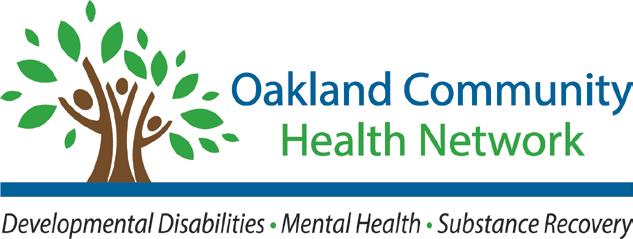
OAKLAND COMMUNITY HEALTH NETWORK
OAKLAND COUNTY’S PUBLIC BEHAVIORAL HEALTH SYSTEM


WINTER-SPRING | 2024 • The QUAD • 31
provides
for professional
Please visit oaklandchn.org for more career information. SERVING INDIVIDUALS WITH: • Intellectual or Developmental Disabilities • Mental Health Challenges • Substance Use Disorders INSPIRE HOPE • EMPOWER PEOPLE • STRENGTHEN COMMUNITIES Non-emergency ACCESS 248-464-6363 www.oaklandchn.org
Oakland Community Health Network
excellent employment opportunities with competitive salaries and a comprehensive benefits package. The positive work environment encourages innovation and accountability while providing many opportunities
development.
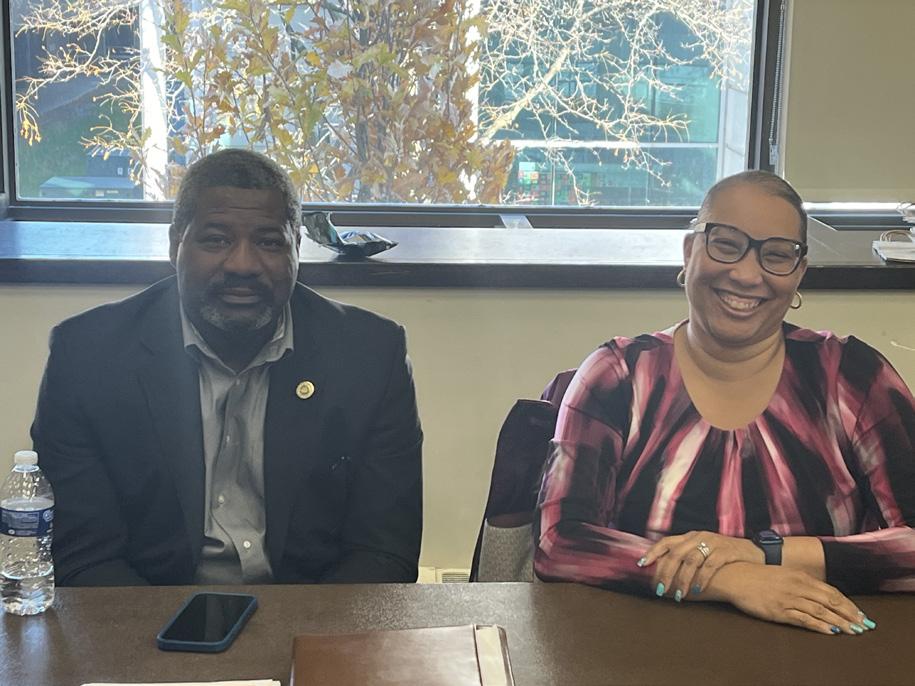
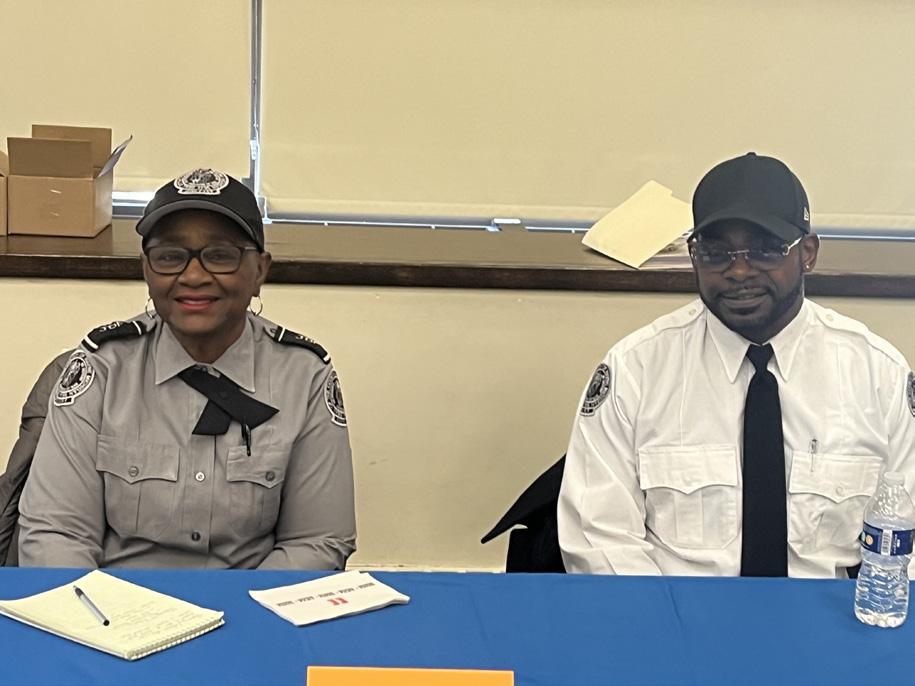

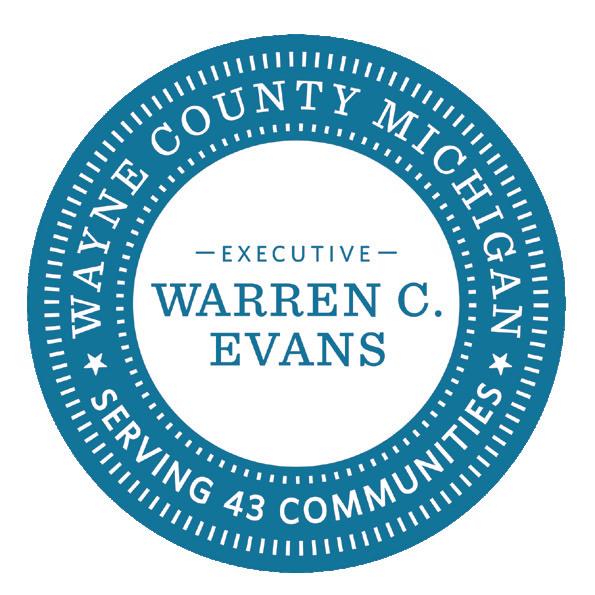
Reimagine Your Career With Wayne County
Here at Wayne County, you will receive a health incentive to assist with the rising cost of health care. We are in collaborative bargaining with all our unions. Wayne County Executive Warren C. Evans is increasing salaries to be competitive with private and municipal employers. Do not hesitate another moment. Reimagine your career with Wayne County. Are you seeking new career opportunities with excellent benefits and a supportive work environment? Look no further than Wayne County, where we redefine the employee experience. Mr. Toson Knight, our passionate Juvenile Youth Services representative, shares his testimony on how Wayne County has allowed him to reimagine his career. He emphasizes our outstanding benefits, tuition reimbursement program, parking benefits, health savings accounts, and alternative/remote work schedules. Knight says, “Working here at Wayne County gives me an opportunity to do what I love the most and that is work with youth.”
Take a glance at the beaming faces of Wayne County employees, captured in various photos throughout this article, showcasing the joy and satisfaction found in our vibrant work environment. A few highlight our partnerships working with Dearborn Access and SEMCA Michigan Works. They also show others, who are part of our team, like the Wayne County Sheriff’s Department, Wayne County Economic Development Department, Wayne County Public Services Department, Wayne County Juvenile and Youth Services Department, Wayne County Senior Services Department, and Wayne County Department of Public Service. An employee is shown driving a snow removal truck to clear snow away from Wayne County Roads.

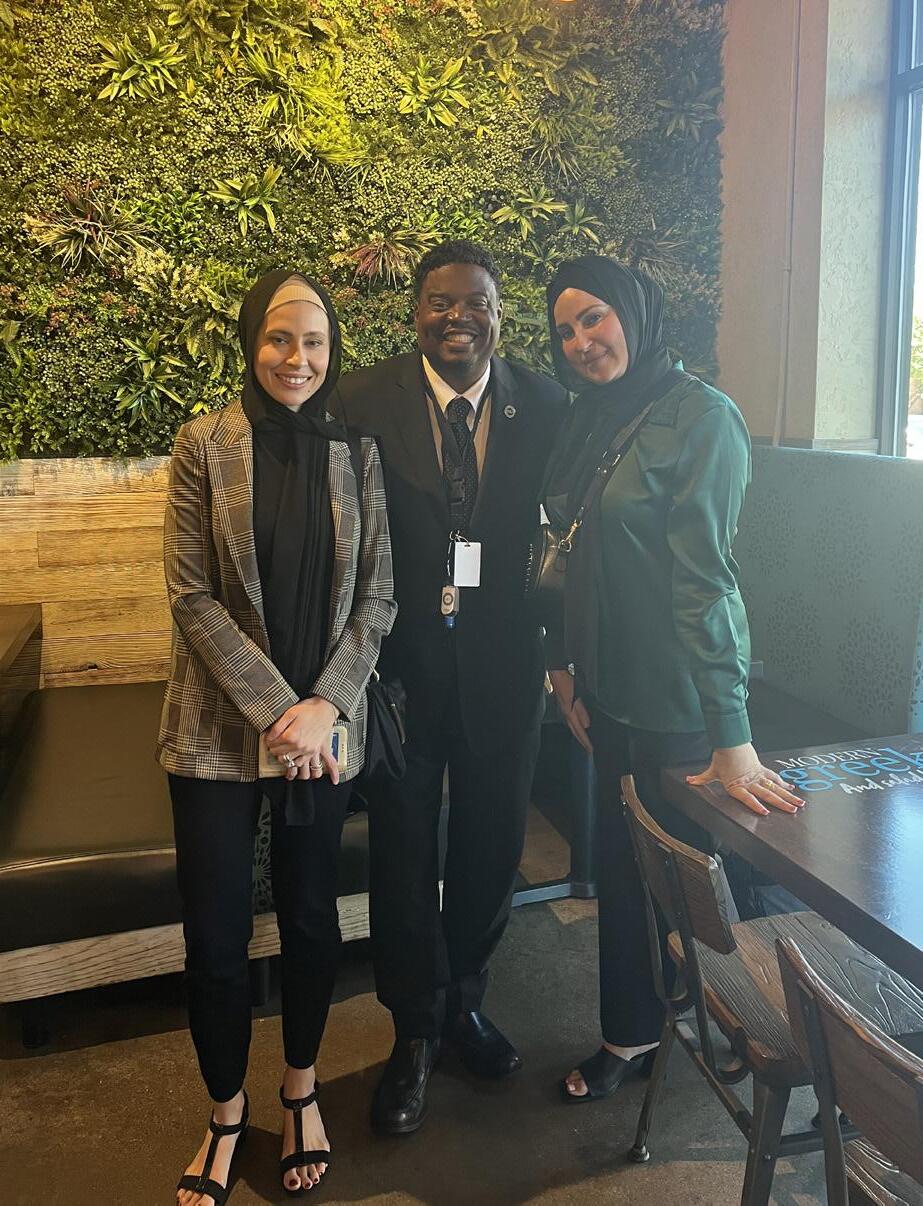

32 • The QUAD • WINTER-SPRING | 2024
Wayne County aims to spread a new message with its REIMAGNE YOUR CAREER campaign, led by the Department of Personnel/Human Resources. Signaling a change in branding, the new practices in areas such as recruitment and employee engagement are the first steps to organizational effectiveness, recruitment and retention. The initiative to rebrand the employee life cycle also offers existing employees a forward-facing approach to the new direction.
The REIMAGINE YOUR CAREER campaign focuses on putting the employee experience at the center of the county’s recruitment and retention efforts.. From an applicant’s initial contact with recruitment staff to internal promotional opportunities, employees can now align the succession of their careers through countless possibilities. For instance, an applicant that begins as a Laborer within the Department of Public Service could later become the Division Director; or an Assistant Prosecutor Attorney with the Wayne County Prosecutor’s Office depending on their career interest and educational pursuits.
The spectrum of careers currently spans over 300 vacant positions. Whether an applicant is just beginning their career or a seasoned professional, Wayne County has an opportunity for you. In a rapidly changing economic climate, applicants can find career opportunities to serve the 43 unique Communities in One Great County! Wayne County’s Department of Personnel/Human Resources plans to show prospective applicants that wanting an impactful career and a competitive wage and benefits, within public service, is a positive step toward REIMAGINING YOUR CAREER.
For more information, please see the waynecounty.com/jobs page, scan the QR code below, Facebook, LinkedIn or download the Wayne County mobile application from the Apple App Store (https://apps.apple.com/us/ app/wayne-county-mobile/id1449796370?ls=1) or Google Play (https:// play.google.com/store/apps/details?id=com.waynecounty.wcMobileApp). If reasonable accommodation is needed to participate in the job application or interview process, to perform essential job functions, and/or to receive other benefits and privileges of employment, please contact the Wayne County Department of Personnel/Human Resources at 313-224-5901 or via email at hrexam@waynecounty.com.


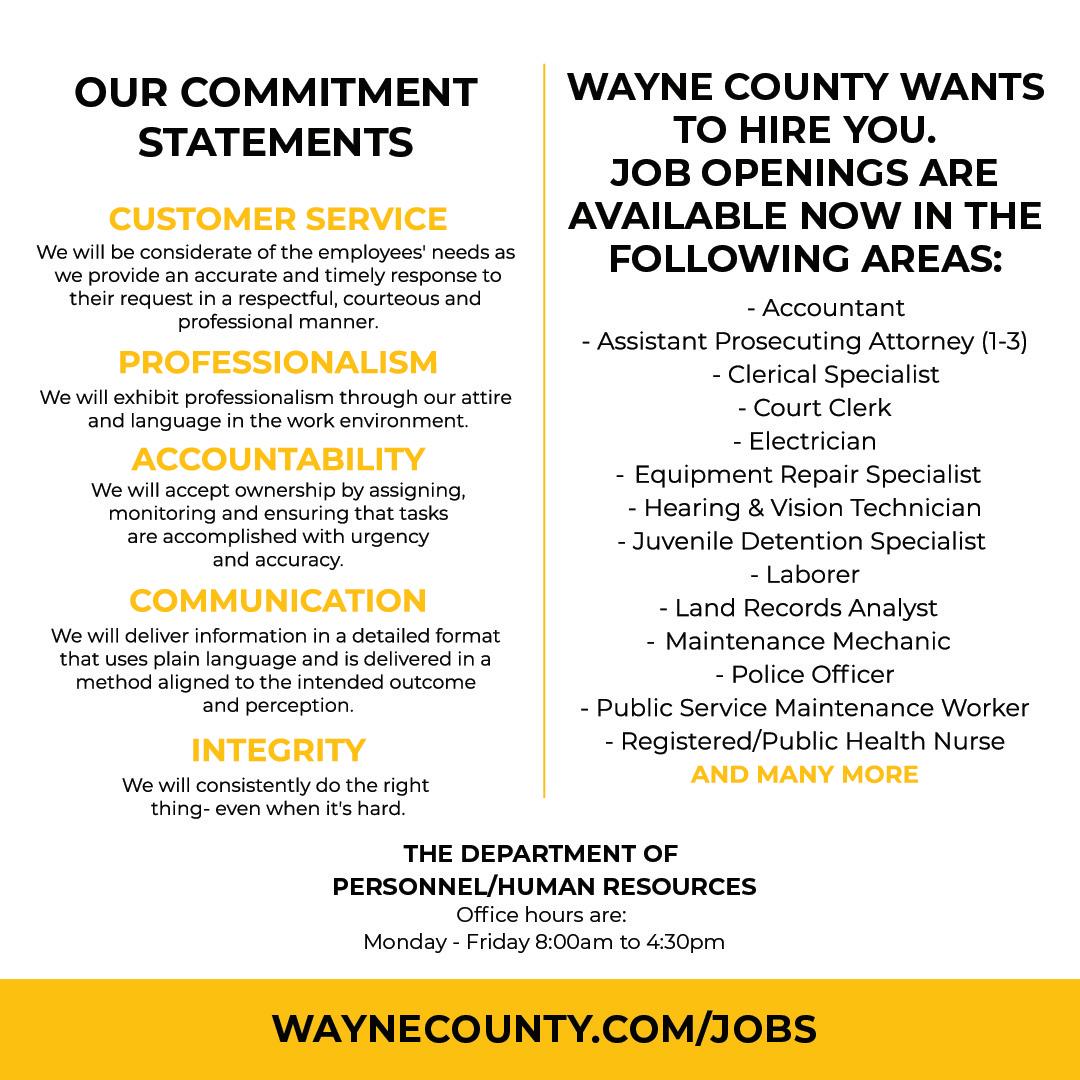
WINTER-SPRING | 2024 • The QUAD • 33 FALL | 2022 • The QUAD • 27
By Donald James Senior Writer, Real Times Media
For decades, if not centuries, teachers in America’s public school systems have been called noble professionals, playing critical roles in imparting academic knowledge, life skills, and values to students while relentlessly inspiring them to become contributing members of almost every career and sector of society. In essence, teachers are standard-bearers of one of the oldest and most respected occupations in the history of the United States and beyond. Yet, for at least the last four-plus decades, America has faced a growing teacher shortage crisis throughout many public school districts in the inner city, suburbs, and rural areas.
According to the U.S. Department of Education, all 50 states reported teaching shortages during the 2022- 2023 school year. Similar findings have been reported across the United States during the current 2023 – 2024 school year.
Multiple studies conducted by teaching and education stake-holding entities offer an array of reasons for the sustained trend of losing teachers. Among the most prevalent reasons for teachers leaving the profession include, but are not limited to, low salaries, the deterioration of student behavior, the politicization of school curriculums, challenging work environments, in-building safety, and job burnout. Since 2020, COVID-related issues have added another layer of concern, causing teachers to leave their profession in pursuit of other occupations. In most research events conducted on teacher shortages in American public school systems, the pattern is most pronounced in geographic locations with a large population of Black and Brown students. Such research gives credence to teacher shortages as not necessarily caused by an inadequate number of qualified teachers but simply not having enough qualified teachers “willing to work” in perceived adverse conditions and environments for low financial compensation.
Although many moving parts are associated with the rising rates of teacher shortages across the nation, actionable strategies are occurring to stem the tide in public schools across the land. While Michigan is not immune to the rollercoaster of keeping teachers on board with the twists and turns of the educational ride from Pre-K through the 12th
grade, the Wolverine State has been acknowledged for its strategies for tackling teacher shortage issues.
Based on a July 2023 report released by the U.S. Department of Education, Michigan’s initiative “Raise the Bar: Lead the World” is lauded for its national leadership in four areas critical to addressing the teacher shortage crisis: enrollment growth in educator preparation programs, job recovery in education, enhancing teacher recruitment, and the retention of teachers.
“This report proves that Michigan is leading the nation as one of the best states to be a teacher,” said Gov. Gretchen Whitmer. “To improve student outcomes, we must support the education professionals who help our kids thrive. Together, we have made record bipartisan investments in our educators. Let’s keep working together to grow the teaching profession and ensure every classroom in every school has a qualified, skilled teacher at the front of the classroom.”
Why is the ability to retain qualified and dedicated teachers so important? Educational researchers agree that teacher shortages harm student learning, causing other teachers to take on added responsibilities and stress without necessarily receiving higher pay. In addition, the public education system, in its entirety, is impacted. Without qualified teachers in the classrooms, many schools are forced to use substitute teachers and other staff members for prolonged periods, posing learning challenges and threats to students’ educational development while undermining the goals of subjects being taught by qualified teachers as content experts.
Fully understanding and committed to addressing teacher shortages in Michigan, the governor and state legislature have appropriated over half-billion dollars in teacher recruitment and retention efforts in each of the last two state budgets.
“With record investments in education by Governor Whitmer and the state legislature, including for teacher recruitment and retention, coupled with a strong commitment by schools and education partners, Michigan has become a national leader in addressing the teacher shortage,” said Dr. Michael Rice, State Superintendent and principal executive of the Michigan Department of Education. “Our efforts are bearing fruit, and we’re making significant

progress, but we still have a long way to go. However, we are appreciative of the fact that the United States Department of Education has shared data on state and national efforts to address the teacher shortage.”
Michigan’s efforts to increase the number of students preparing for careers as teachers have generated greater diversity in the profession. Over the past seven years, there has been an increase of 1,316 Black/African American full-time equivalent (FTE) teachers and 216 Hispanic/Latino FTE teachers.
In Detroit, home of Detroit Public School Community District (DPSCD), Michigan’s largest school district, and the state’s largest Black student population, creative measures have been taken to ensure that the issues centered on teacher shortages are remedied. DPSCD is rising to meet the challenge of filling vacant teaching positions with a homegrown approach and an alternative route to certification.
Since 2021, the District has implemented “On the Rise Academy,” approved by the state of Michigan to streamline the arduous process of bringing certified teachers into the classrooms of public schools in Detroit.
On the Rise Academy prepares aspiring and continuing teachers for success in the classroom and offers two routes to teacher certification or additional endorsement: Fellow and Continuing Teacher. The fellowship program is for aspiring teachers who haven’t yet been certified, whereas the continuing education path is for already-practicing teachers who want to specialize in a particular special education area. Similar programs in Michigan are offered through Michigan Teachers of Tomorrow, Professional Innovators in Teaching, and Wayne State University’s Warrior Teacher Program. For individuals compelled to teach in public schools and not be deterred by the teacher shortage crisis in America and the litany of reasons why it is happening, teaching jobs are available locally, regionally, and nationally with the correct set of circumstances.
To learn more about becoming a teacher in Michigan – through traditional and expedited pathways, log on to the Michigan Department of Education at https://www.michigan.gov/mde/services/ed-serv/ ed-cert/cert-guidance/becoming-a-teacher.
34 • The QUAD • WINTER-SPRING | 2024
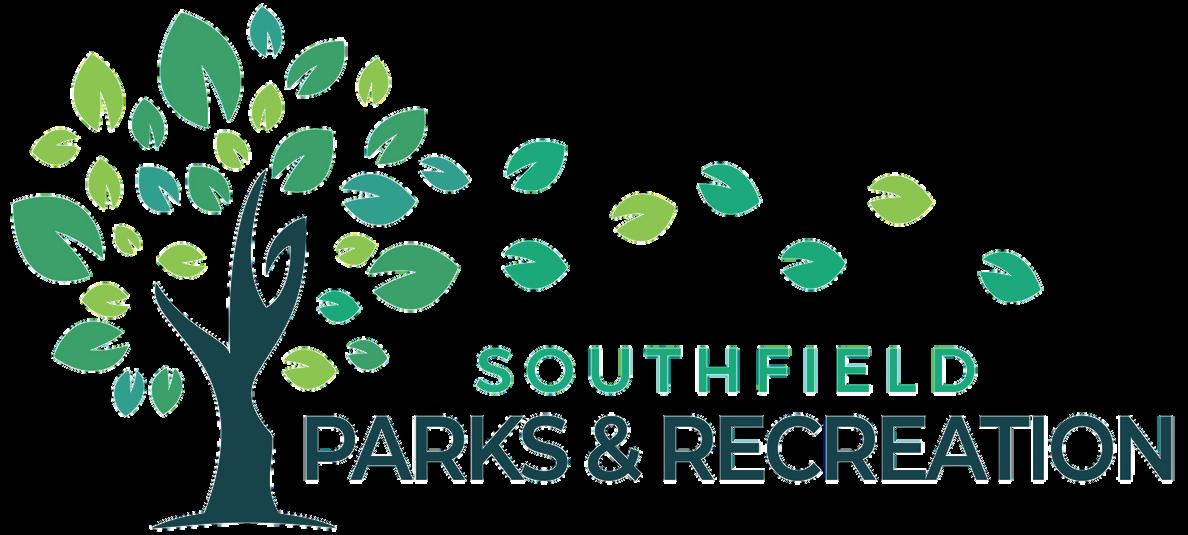
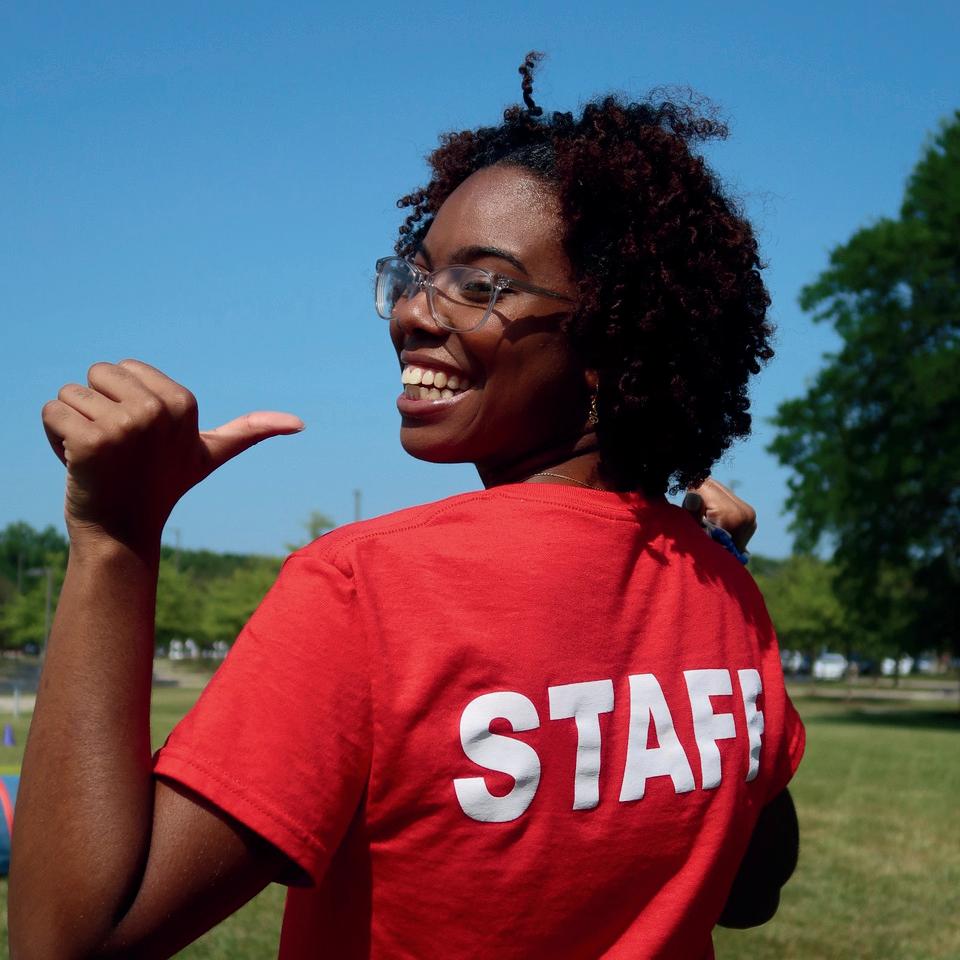
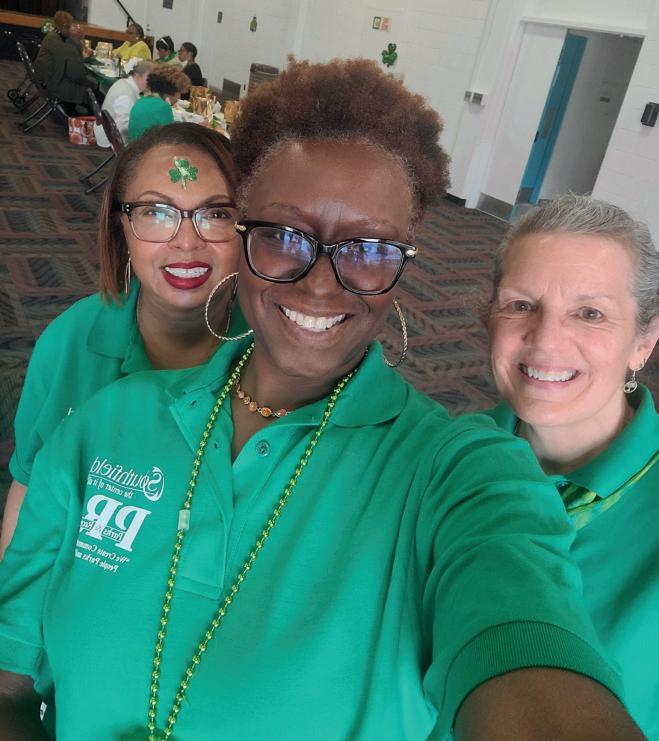




DAY CAMPS GOLF PARK MAINTENANCE DRIVERS MOBILE RECREATION SENIOR SERVICES CUSTOMER SERVICE FACILITIES COMMUNITY GARDENS SUMMER JOB FAIRS Join our team and experience the fun of working in Parks and Recreation!
Available for Seasonal (up to 40 hours a week) and Part-Time (30 hours a week
Workers 18 Years and Older SOUTHFIELD PAVILION, 26000 EVERGREEN RD CALL US FOR MORE DETAILS (248) 796-4620 TUESDAY, MARCH 5 1 - 3 PM THURSDAY, MARCH 7 5 - 7 PM SATURDAY, MARCH 9 10 AM - 12 PM
Opportunities
or less)









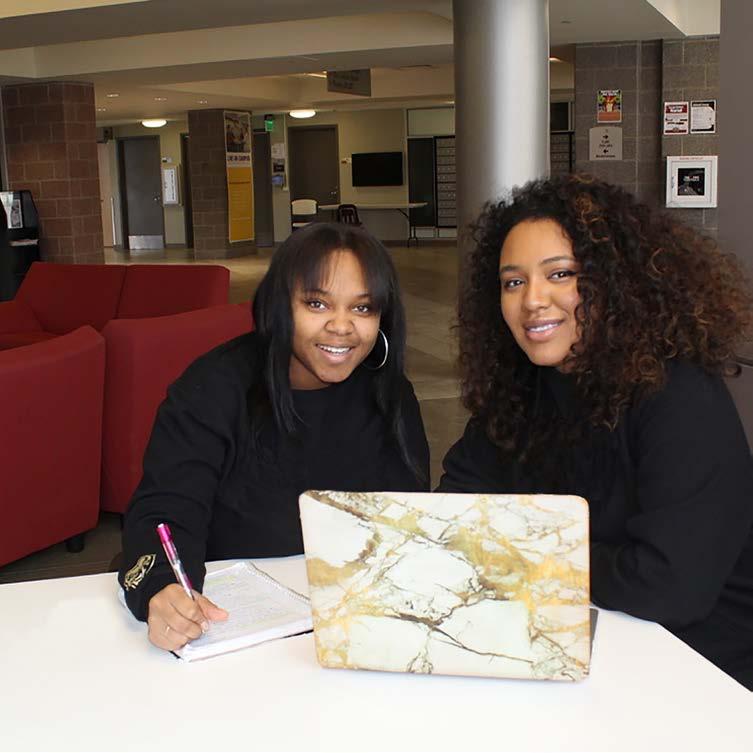










36 • The QUAD • WINTER-SPRING | 2024 Open the Door to Your Career 2019 FOLLOW YOUR DREAM…PURSUE YOUR INTERESTS… 2021 Thriving Through COVID WINTER/SPRING 2021 2019 UNDERGRADUATE & GRADUATE PROGRAMS TO PREPARE YOU… TO PROPELL YOU… FOR A BRIGHTER FUTURE TOMORROW 2018 Moving Forward on the road to success 2017 “Success doesn’t come to you... you go to it.” -Marva Collins, African American Educator Inside: Tips on Enrollment, Money and College Life! 2020 2020 Preparation Awaits Opportunity The Quad presents information to help you along this path of making decisions about your future. CHOICES – DECISIONS We need information to help us make the right choice. The Quad is published in February and September to share information about career choices, job opportunities and inspirational stories to encourage you and guide you. Look for the next edition of the Quad - September 25, 2024.



































































































































 OAKLAND COMMUNITY COLLEGE oaklandcc.edu/admissions
OAKLAND COMMUNITY COLLEGE oaklandcc.edu/admissions



















 By Donald James Senior Writer, Real Times Media
By Donald James Senior Writer, Real Times Media









































